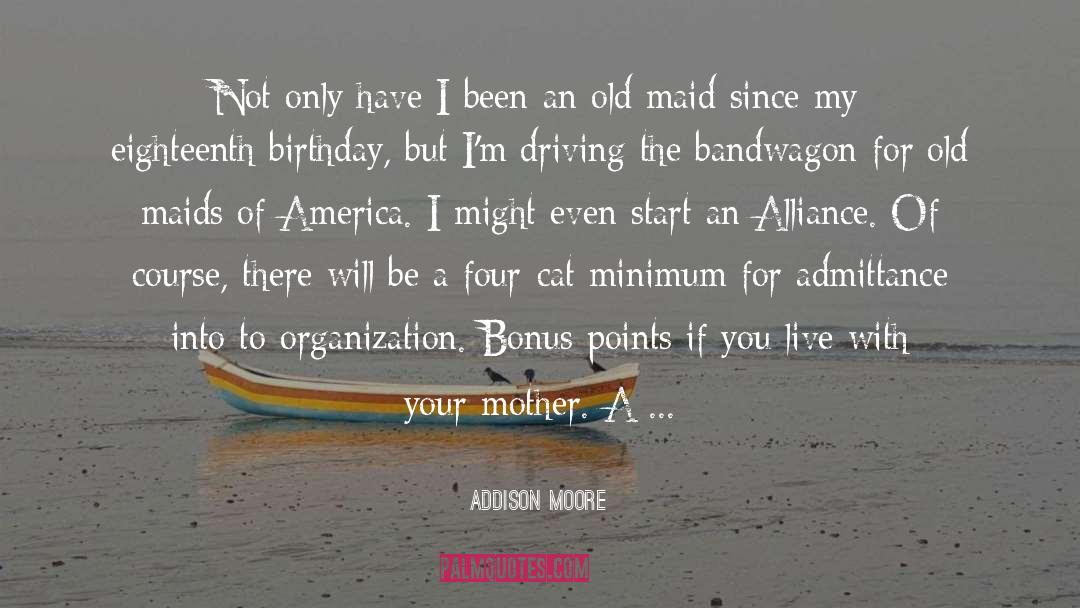Quotes About Eighteenth
Enjoy collection of 100 Eighteenth quotes. Download and share images of famous quotes about Eighteenth. Righ click to see and save pictures of Eighteenth quotes that you can use as your wallpaper for free.
I don't make to-do lists, but if I did, today's would have gone something like this: 1. get drunk, 2. get laid, 3. go surfing (not necessarily in that order.) Noticeably absent from the list: get arrested. And yet here I am, spending my eighteenth birthday with my back against the wall of the Colonel's hunting cabin, two FBI agents prowling the dark with their guns drawn, both trying to get me to confess to the murder of my friend Preston DeWitt. ~ Paula Stokes
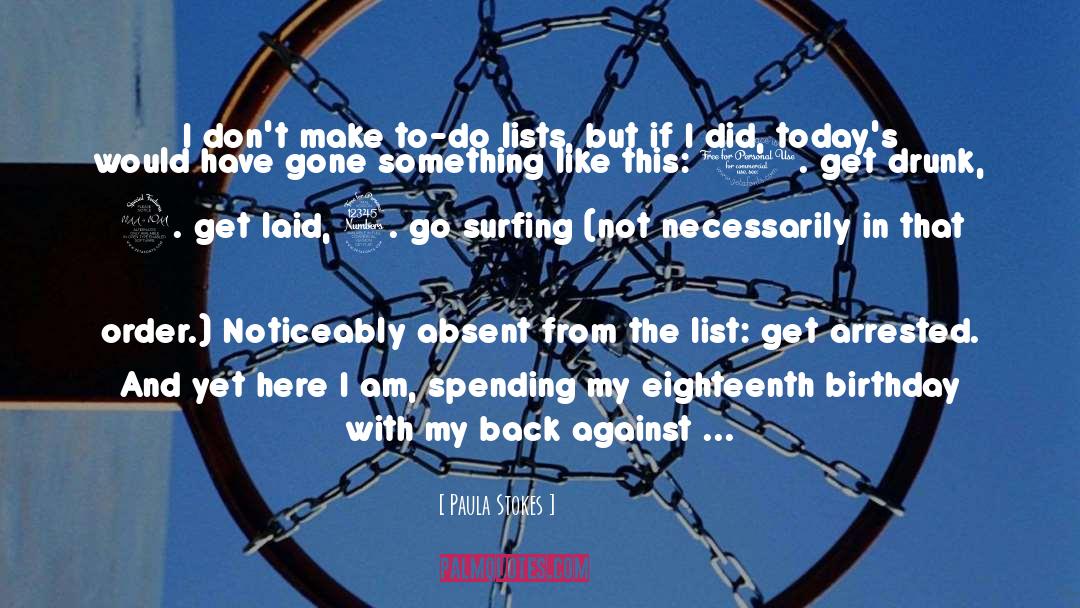
From that point on, the extraordinary system of spies and informers which has played an important part in the political work of the French state into our own time took shape. (Sartine, who became lieutenant general de police in 1759, is supposed to have said to Louis XV, "Sire, when three people are chatting in the street one of them is surely my man.") Eighteenth-century police manuals like those of Colquhoun in England or Lemaire in France are no less than general treatises on the government's full repertoire of domestic regulation, coercion, and surveillance. ~ Charles Tilly
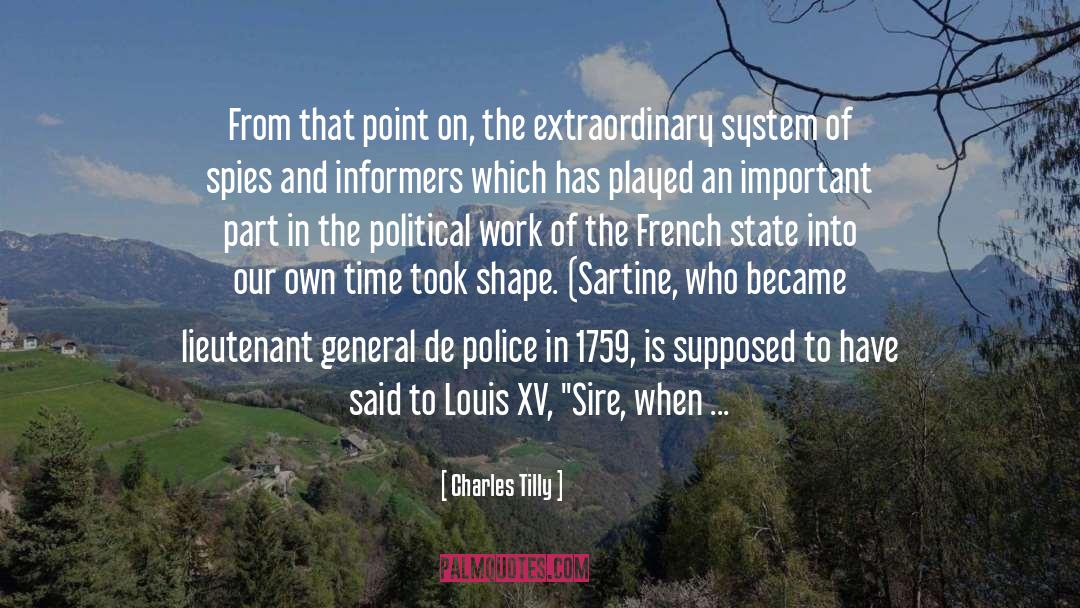
After one of his [Hubert Humphrey] long-winded harangues I suggested he had probably been vaccinated with a phonograph needle. He responded by saying that I would have been a great success in the movies working for Eighteenth Century-Fox. ~ Barry Goldwater

Liberty had many friends in the eighteenth century. ~ Edmund Morgan
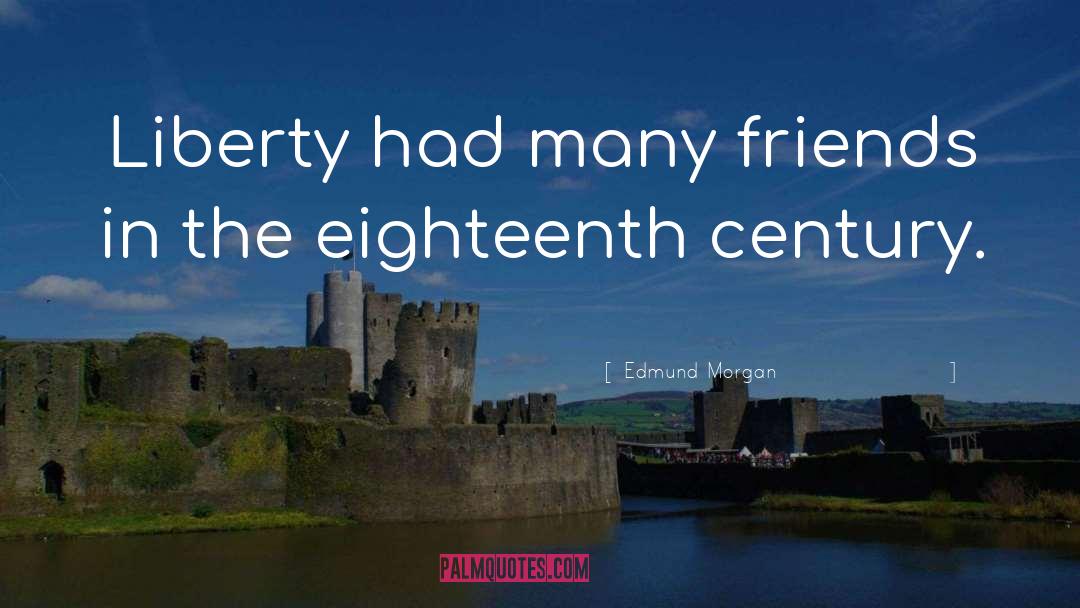
I should be inclined, therefore, as I have hinted before, to consider the world and this life as the mighty process of God, not for the trial, but for the creation and formation of mind, a process necessary to awaken inert, chaotic matter into spirit, to sublimate the dust of the earth into soul, to elicit an ethereal spark from the clod of clay. And in this view of the subject, the various impressions and excitements which man receives through life may be considered as the forming hand of his Creator, acting by general laws, and awakening his sluggish existence, by the animating touches of the Divinity, into a capacity of superior enjoyment. The original sin of man is the torpor and corruption of the chaotic matter in which he may be said to be born. ~ Thomas Robert Malthus
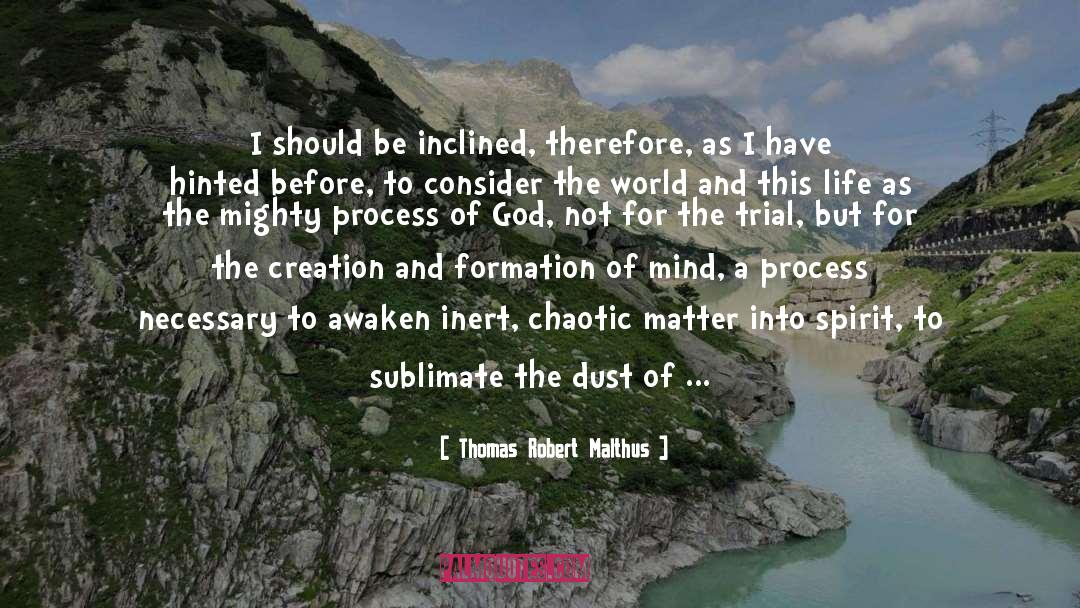
The eighteenth century discovery that, in an institutional framework that facilitates voluntary exchanges among individuals, this process generates results that might be evaluated positively, produced 'economics,' as an independent academic discipline or science. ~ James M. Buchanan
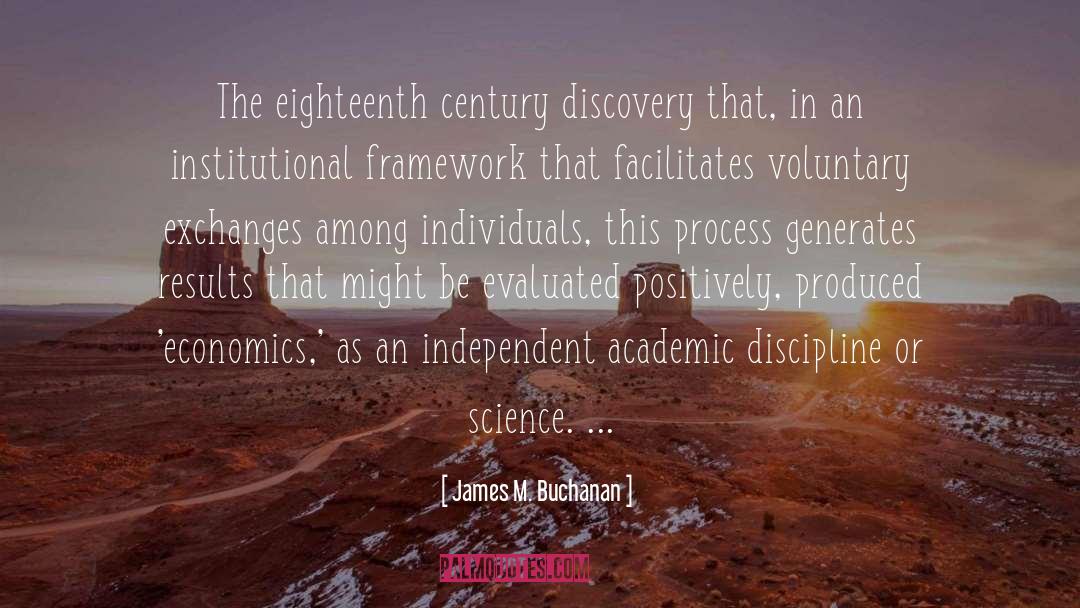
"You see, I do a little in this way myself," he explained; "here is my most prized piece." He took from his pocket a snuffbox, which looked to be of eighteenth-century workmanship. Inside the lid was an enamel picture of Leda and the Swan, and when a knob was pushed to and fro the swan thrust itself between Leda's legs, which jerked in mechanical ecstasy. A nasty toy, I thought, but Urky doted on it. "We single gentlemen like to have these things," he said. "What do you do, Darcourt? Of course we know that Hollier has his beautiful Maria."
To my astonishment Hollier blushed, but said nothing. His beautiful Maria? My Miss Theotoky, of New Testament Greek? I didn't like it at all. ~ Robertson Davies
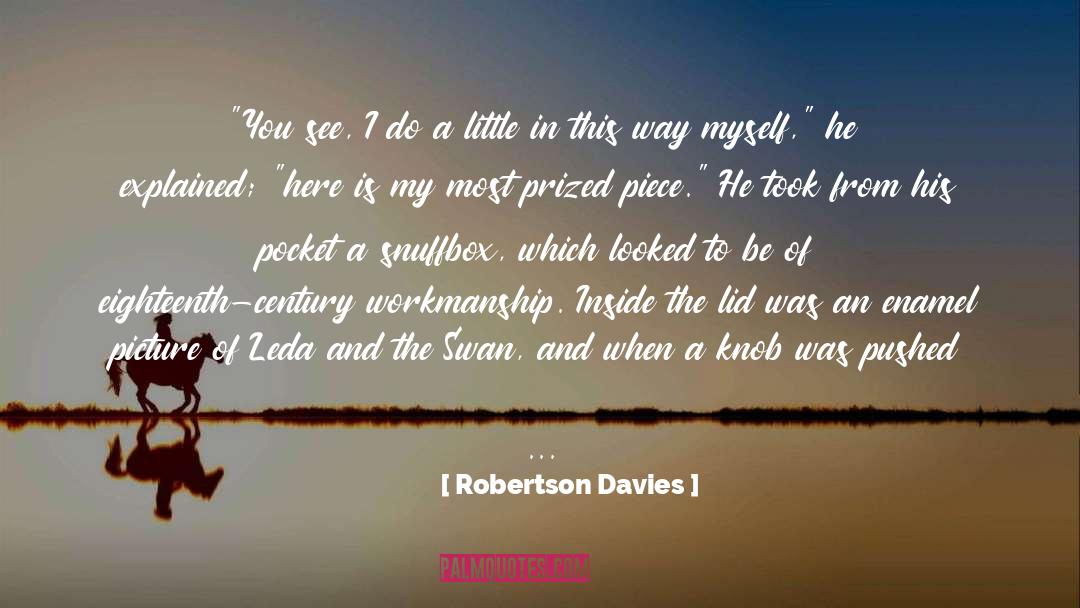
Voltaire was also there, fleeing a royal arrest warrant, and working as a kind of one-man eighteenth-century USO show during the siege, offering bons mots and brandy between bouts of battle and composing odes to the military men. The ~ Tom Reiss

I'm totally in love with Jane Austen and have always been in love with Jane Austen. I did my dissertation at university on black people in eighteenth-century Britain - so I'd love to do a Jane Austen-esque film but with black people. ~ Naomie Harris
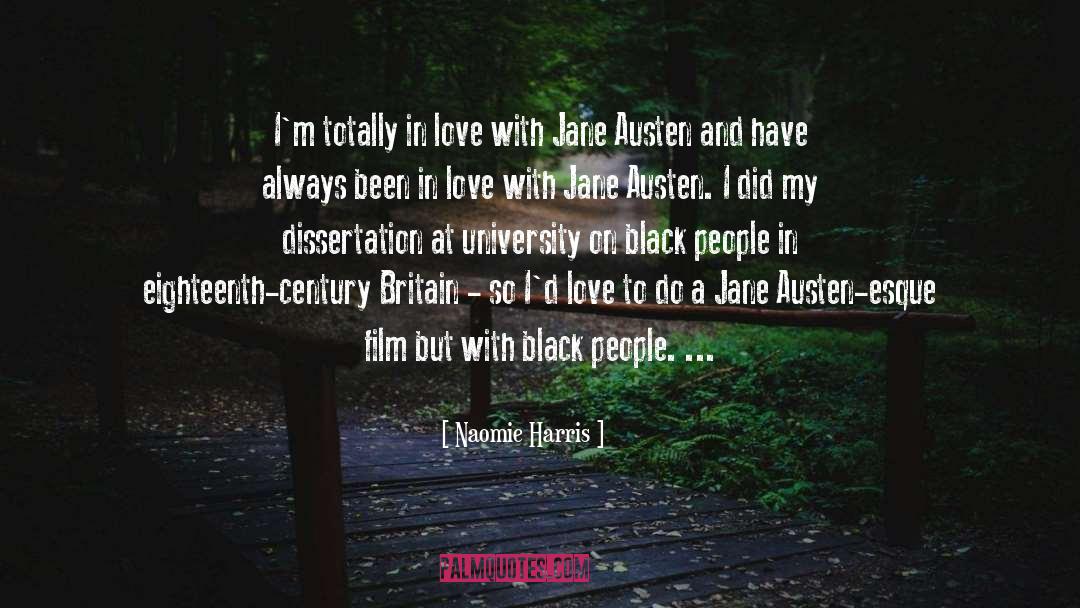
Empires exist for the benefit of the parent state. That, and the fact that the colonists eventually came to appreciate this truth, goes a long way toward explaining the origins of the American Revolution. Throughout the seventeenth and eighteenth centuries, the authorities in London, the seat of Great Britain's empire, ~ John Ferling

[Doubt] is not a new idea; this is the idea of the age of reason. This is the philosophy that guided the men who made the democracy that we live under. The idea that no one really knew how to run a government led to the idea that we should arrange a system by which new ideas could be developed, tried out, and tossed out if necessary, with more new ideas bought in - a trial-and-error system. This method was a result of the fact that science was already showing itself to be a successful venture at the end of the eighteenth century. Even then it was clear to socially minded people that the openness of possibilities was an opportunity, and that doubt and discussion were essential to progress into the unknown. If we want to solve a problem that we have never solved before, we must leave the door to the unknown ajar ... doubt is not to be feared, but welcomed and discussed. ~ Richard Feynman
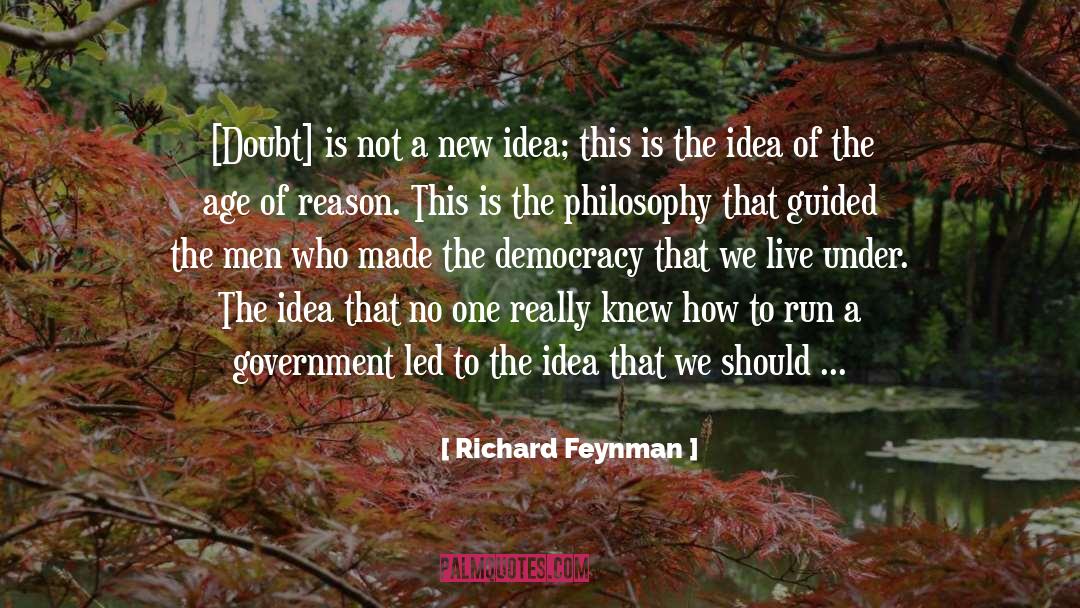
Berthe Morisot was a painter full of eighteenth-century delicacy and grace; in a word, the last elegant and 'feminine' artists since Fragonard. ~ Pierre-Auguste Renoir
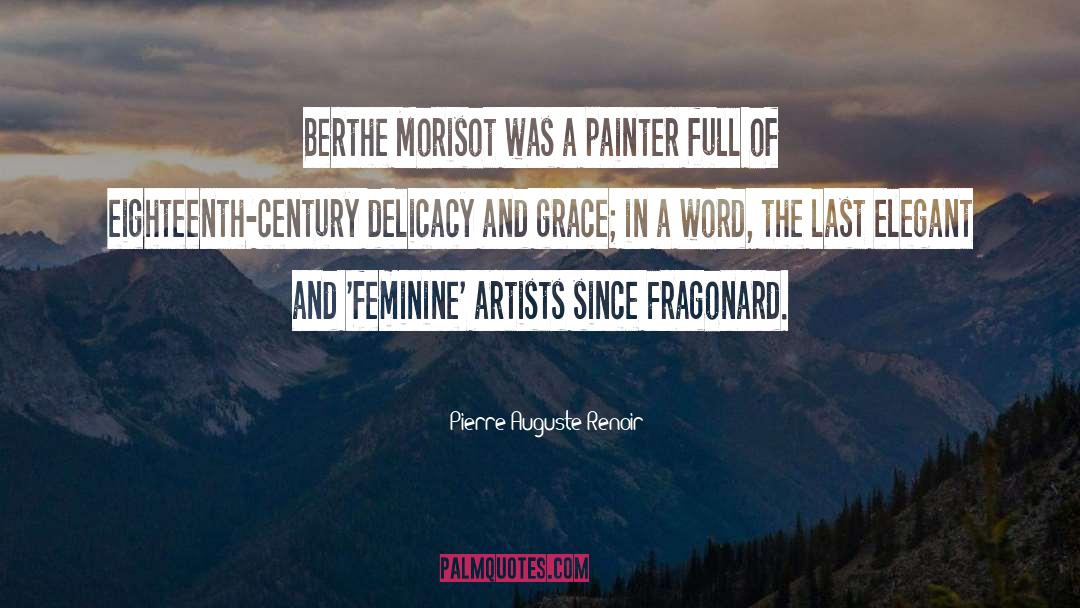
The novels of Daniel Defoe are fundamental to eighteenth-century ways of thinking. They range from the quasi-factual A Journal of the Plague Year, an almost journalistic (but fictional) account of London between 1664 and 1665 (when the author was a very young child), to Robinson Crusoe, one of the most enduring fables of Western culture. If the philosophy of the time asserted that life was, in Hobbes's words, 'solitary, poor, nasty, brutish, and short', novels showed ways of coping with 'brutish' reality (the plague; solitude on a desert island) and making the best of it. There was no questioning of authority as there had been throughout the Renaissance.
Instead, there was an interest in establishing and accepting authority, and in the ways of 'society' as a newly ordered whole.
Thus, Defoe's best-known heroine, Moll Flanders, can titillate her readers with her first-person narration of a dissolute life as thief, prostitute, and incestuous wife, all the time telling her story from the vantage point of one who has been accepted back into society and improved her behaviour. ~ Ronald Carter
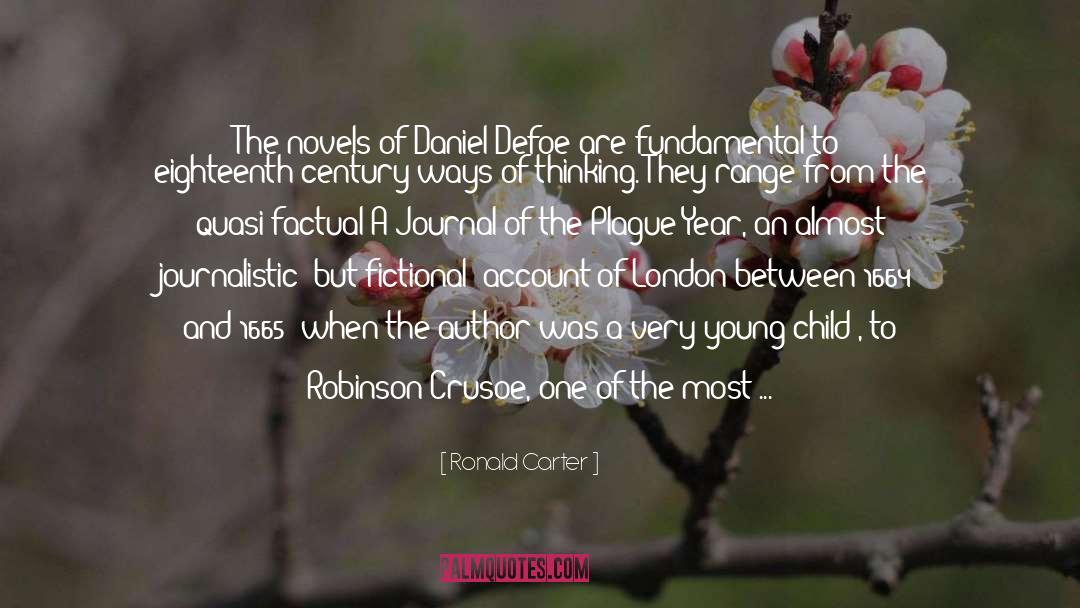
Speaking of novels,' I said, 'you remember we decided once, you, your husband and I, that Proust's rough masterpiece was a huge, ghoulish fairy tale, an asparagus dream, totally unconnected with any possible people in any historical France, a sexual travestissement and a colossal farce, the vocabulary of genius and its poetry, but no more, impossibly rude hostesses, please let me speak, and even ruder guests, mechanical Dostoevskian rows and Tolstoian nuances of snobbishness repeated and expanded to an unsufferable length, adorable seascapes, melting avenues, no, do not interrupt me, light and shade effects rivaling those of the greatest English poets, a flora of metaphors, described - by Cocteau, I think - as "a mirage of suspended gardens," and, I have not yet finished, an absurd, rubber-and-wire romance between a blond young blackguard (the fictitious Marcel), and an improbable jeune fille who has a pasted-on bosom, Vronski's (and Lyovin's) thick neck, and a cupid's buttocks for cheeks; but - and now let me finish sweetly - we were wrong, Sybil, we were wrong in denying our little beau ténébreux the capacity of evoking "human interest": it is there, it is there - maybe a rather eighteenth-centuryish, or even seventeenth-centuryish, brand, but it is there. Please, dip or redip, spider, into this book [offering it], you will find a pretty marker in it bought in France, I want John to keep it. Au revoir, Sybil, I must go now. I think my telephone is ringing. ~ Vladimir Nabokov
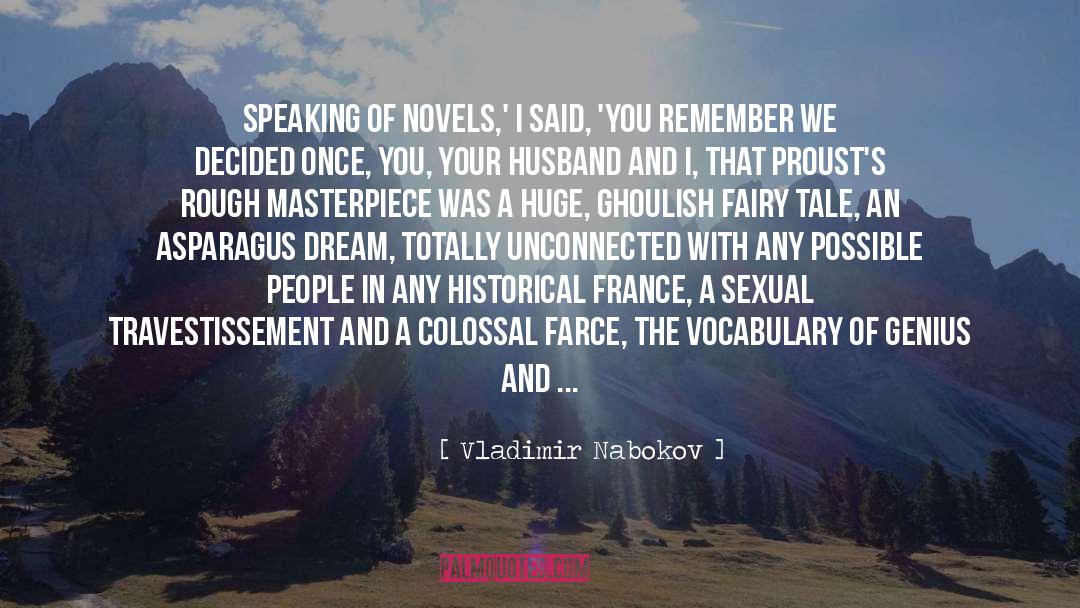
The recurrence during the eighteenth century Enlightenment of the aspiration to be the 'Newton of the moral sciences' testifies to the prestige not just of celestial mechanics, but of the 'experimental method' more generally. ~ Stefan Collini
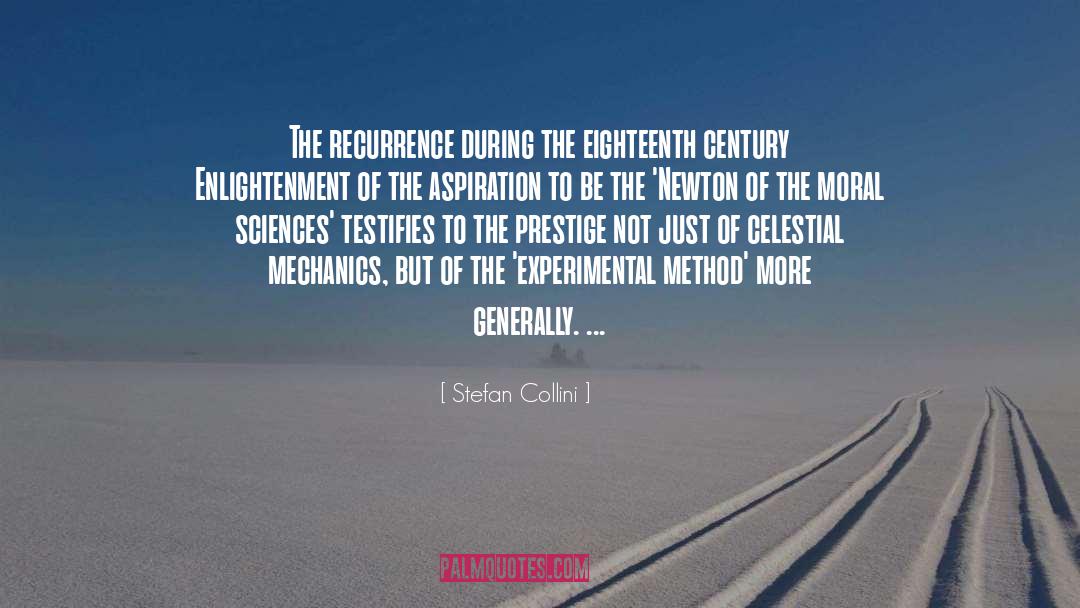
[In eighteenth-century Britain] engineers for the most began as simple workmen, skilful and ambitious but usually illiterate and self-taught. They were either millwrights like Bramah, mechanics like Murdoch and George Stephenson, or smiths like Newcomen and Maudslay. ~ John Desmond Bernal

In his study of eighteenth-century feelings, John Mullan argues that sentimental passion and sympathy offered 'a more inclusive vocabulary of social coherence' than politics could provide. This ~ Francis Wheen
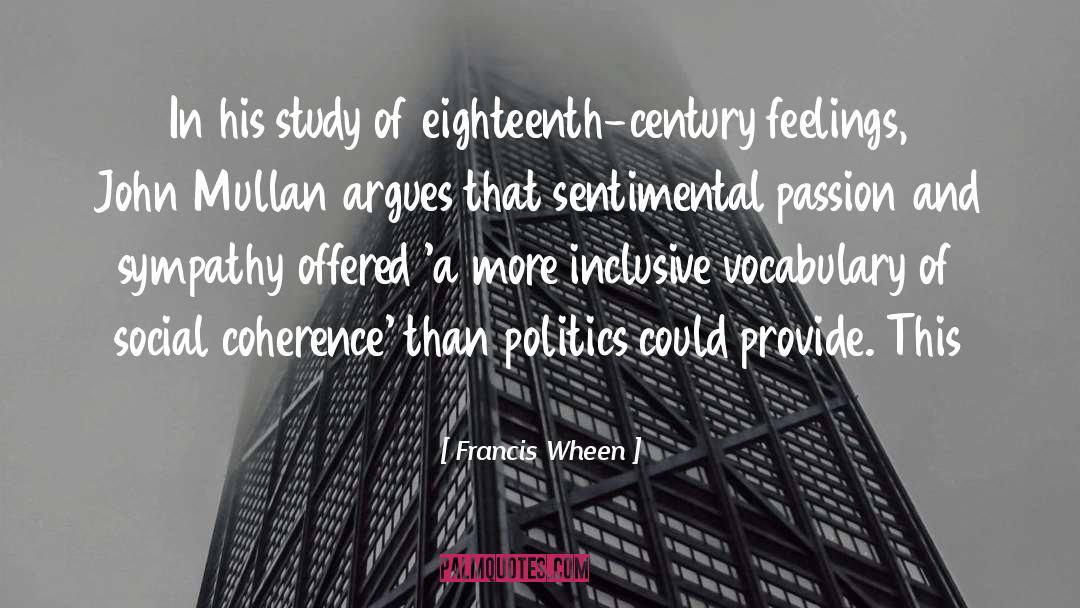
There is such malice, treachery, and dissimulation, even among professed friends and intimate companions, as cannot fail to strike a virtuous mind with horror; and when Vice quits the stage for a moment, her place is immediately occupied by Folly... ~ Tobias Smollett
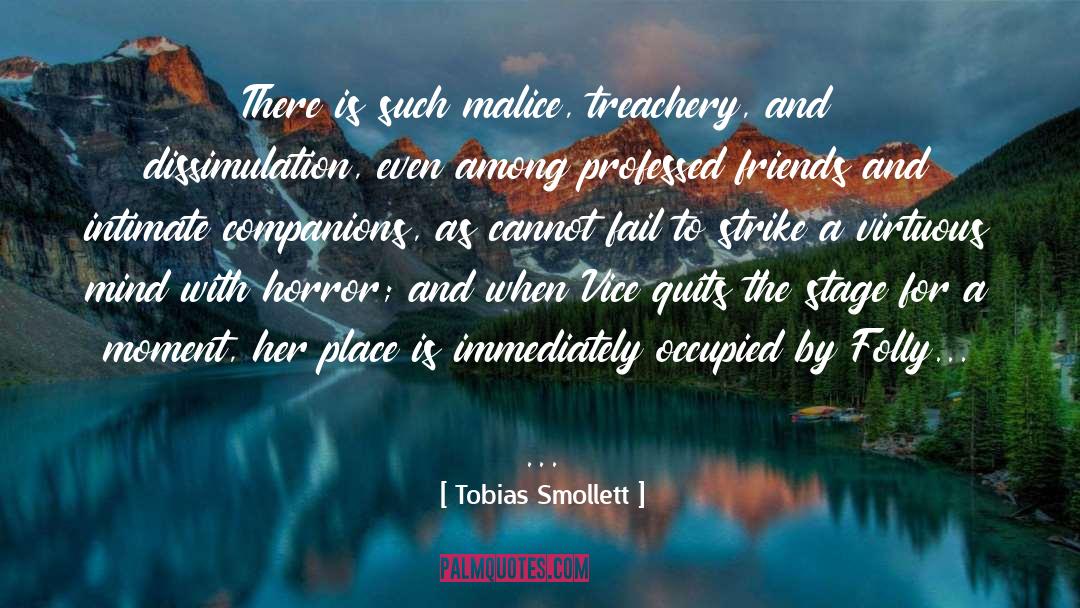
Among Evangelical Christians, all of whom await the Second Coming of Jesus, there are historically two camps: postmillennialists and premillennialists. For most of the seventeenth and eighteenth centuries, most were of the "post" variety, meaning that they expected the Messiah's return after the thousand-year reign of peace. In order to hasten His arrival, they set out to create that harmonious world here and now, fighting for the abolition of slavery, prohibition of alcohol, public education, and women's literacy.
The chaos of the Civil War and industrialization caused many evangelicals to rethink their optimism. They determined that Jesus would actually arrive before the final judgment. Therefore any efforts toward a just society here on earth were futile; what mattered was perfecting one's faith. As historian Randall Balmer writes, these believers "retreated into a theology of despair, one that essentially ceded the temporal world to Satan and his minions. ~ Mark Sundeen
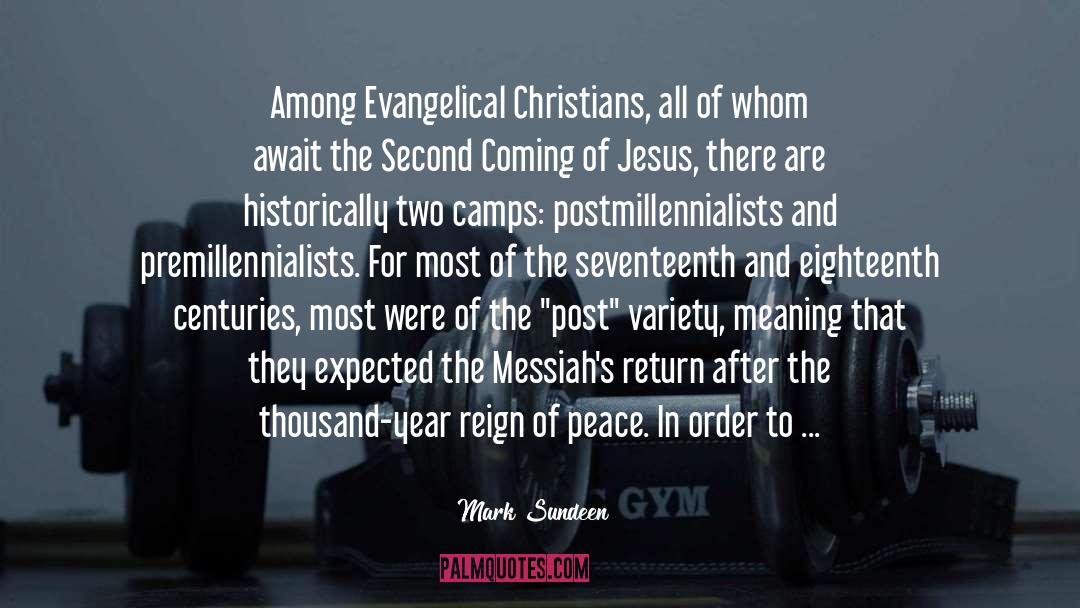
Religion carries two sorts of people in two entirely opposite directions: the mild and gentle people it carries towards mercy and justice; the persecuting people it carries into fiendish sadistic cruelty. Mind you, though this may seem to justify the eighteenth-century Age of Reason in its contention that religion is nothing but an organized, gigantic fraud and a curse to the human race, nothing could be farther from the truth. It possesses these two aspects, the evil one of the two appealing to people capable of naïve hatred; but what is actually happening is that when you get natures stirred to their depths over questions which they feel to be overwhelmingly vital, you get the bad stirred up in them as well as the good; the mud as well as the water. It doesn't seem to matter much which sect you have, for both types occur in all sects.... ~ Alfred North Whitehead
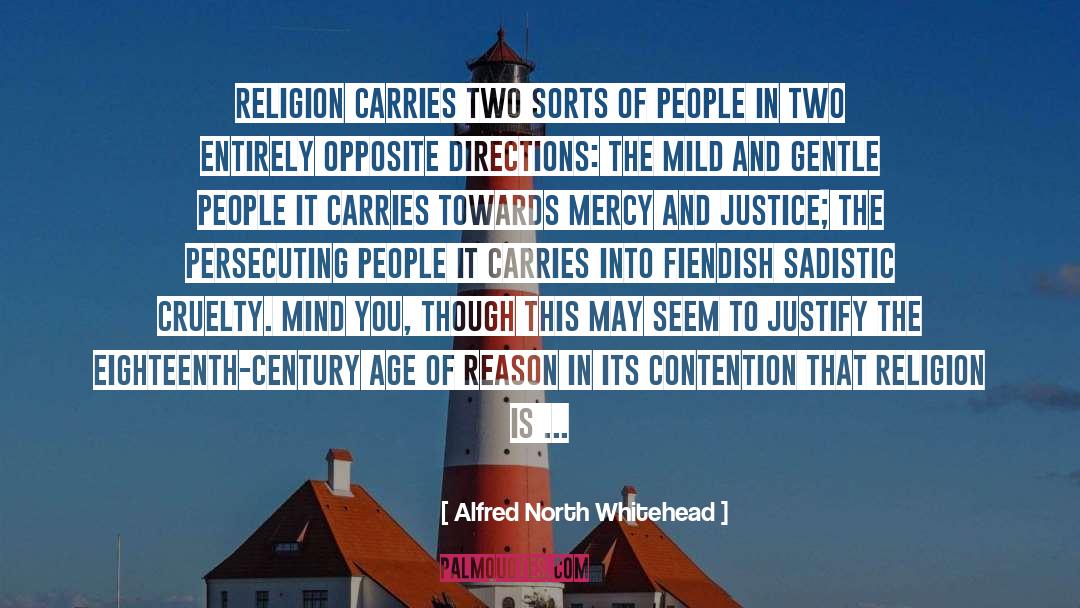
Sadism ... is a massive cultural fact that appeared precisely at the end of the eighteenth century and that constitutes one of the greatest conversions of the occidental imagination ... madness of desire, the insane delight of love and death in the limitless presumption of appetite. ~ Michel Foucault
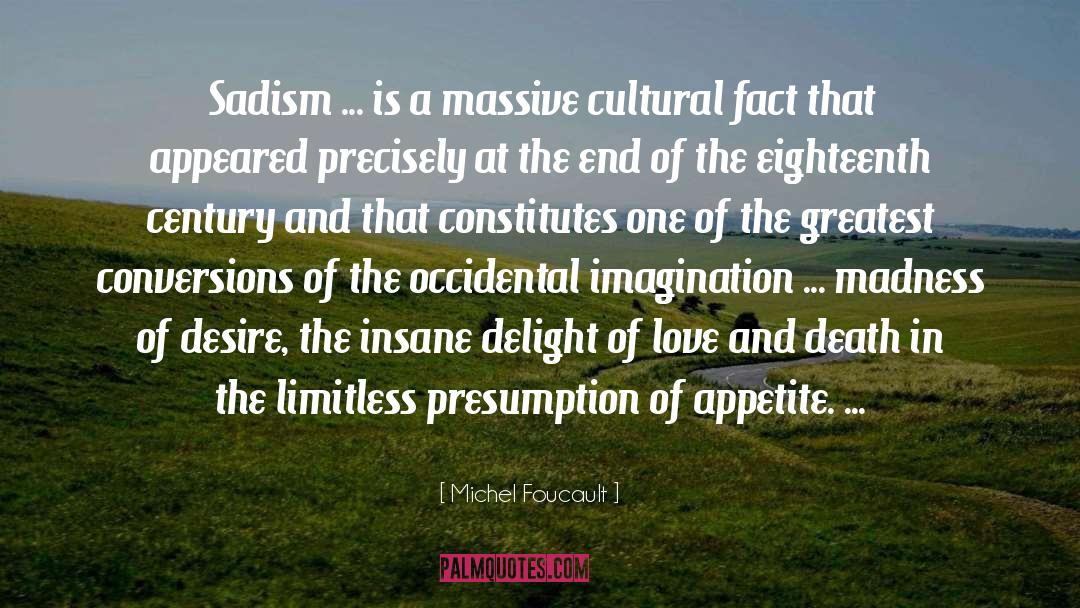
In eighteenth-century Britain, many female friends enjoyed intense relationships, which they celebrated in romantic terms. Some probably compensated for stiff and formal relations with parents by forging close bonds with same-sex friends. In one case, Eleanor Butler and Sarah Ponsonby ran away from their families in Ireland to set up home together in Wales, where they would live in mutual harmony for more than fifty years. Known as the Ladies of Llangollen, they attracted visitors from far and wide who venerated their romantic story with never a hint that the friendship might be anything other than platonic ~ Wendy Moore
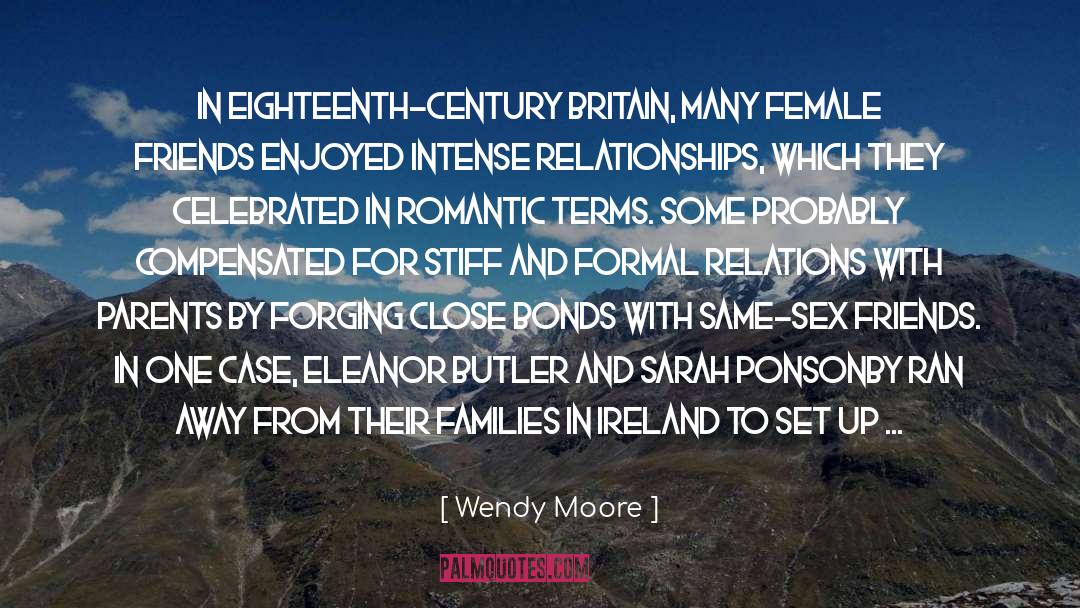
The Sparrow Sisters' roses still bloomed on New Year's Day, their scent rich and warm even when snow weighted their petals closed. When customers came down the rutted road to the small eighteenth-century barn where the sisters worked, they marveled at the jasmine that twined through the split-rail fence, the perfume so intense they could feel it in their mouths. As they paid for their purchases, they wondered (vaguely, it must be said, for the people of Granite Point knew not to think too hard about the Sisters) how it was that clematis and honeysuckle climbed the barn in November and the morning glories bloomed all day. The fruit trees were so fecund that the peaches hung on the low branches, surrounded by more blossoms, apples and pears ripened in June and stayed sweet and fresh into December. Their Italian fig trees were heavy with purple teardrop fruit only weeks after they were planted. If you wanted a tomato so ripe the juice seemed to move beneath the skin, you needed only to pick up a punnet at the Nursery. ~ Ellen Herrick
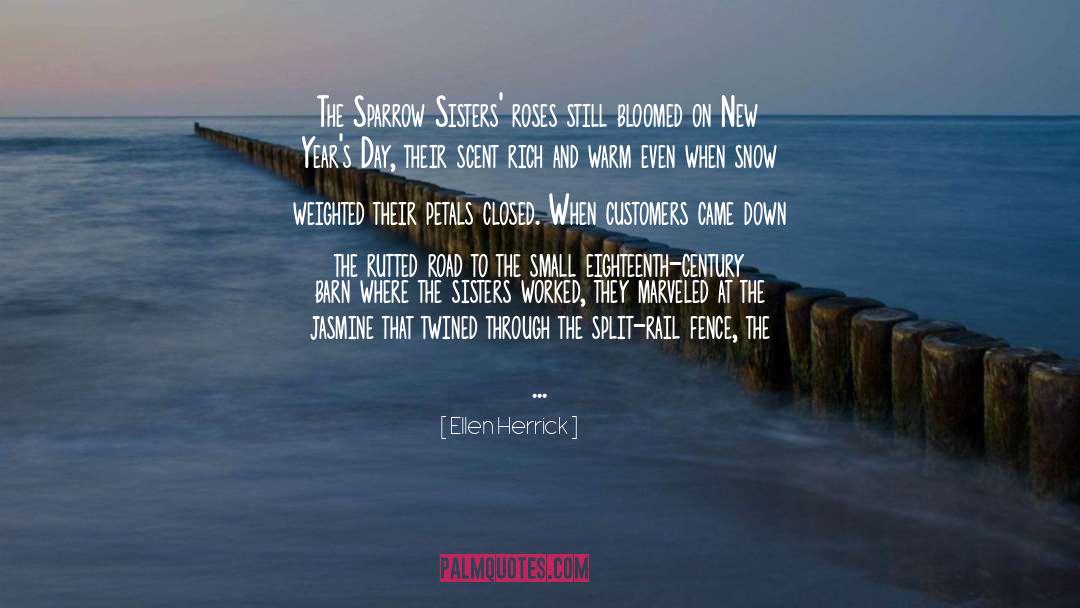
Just as we do not today differentiate between the Roman Republic and the imperial period of the Julio-Claudians when we think of the Roman Empire, so in the future no one will bother to make a distinction between the British Empire-led and the American-Republic-led periods of English-speaking dominance between the late-eighteenth and the twenty-first centuries. It will be recognized that in the majestic sweep of history they had so much in common
and enough that separated them from everyone else
that they ought to be regarded as a single historical entity, which only scholars and pedants will try to describe separately. ~ Andrew Roberts
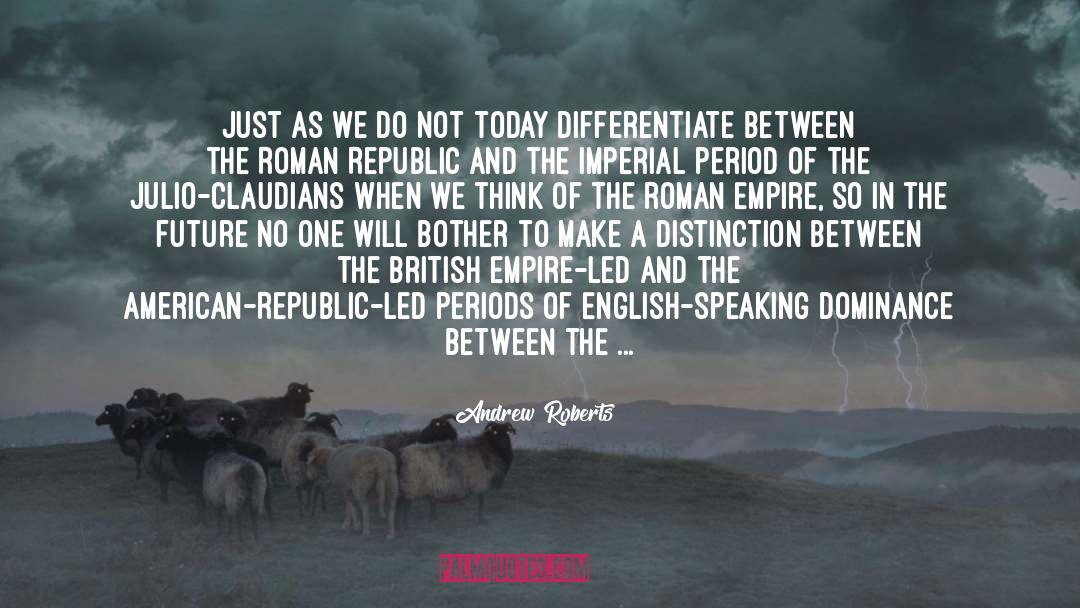
The zealous display the strength of their belief, while the judicious show the grounds of it. - WILLIAM SHENSTONE, EIGHTEENTH-CENTURY POET AND LANDSCAPE DESIGNER ~ Josh Kaufman

Once again we may ask - how is it that Jesus assumed an authority and reign that he did not previously possess? The answer is found in an important distinction. We may distinguish Jesus' essential dominion or reign from his mediatorial dominion or reign. This is how Ebenezer Erskine and James Fisher, two eighteenth-century Scottish commentators on the Westminster Shorter Catechism, express the difference. Q. 17. How manifold is [Jesus'] kingdom? A. It is twofold; his essential and his mediatorial kingdom. Q. 18. What is his essential kingdom? A. It is that absolute and supreme power, which he hath over all the creatures in heaven and earth, essentially and naturally, as God equal with the Father, Psal. ciii. 19, "his kingdom ruleth over all - " Q. 19. What is his mediatorial kingdom? A. It is that sovereign power and authority in and over the church, which is given him as Mediator, Eph. i. 22.52 ~ Guy Prentiss Waters
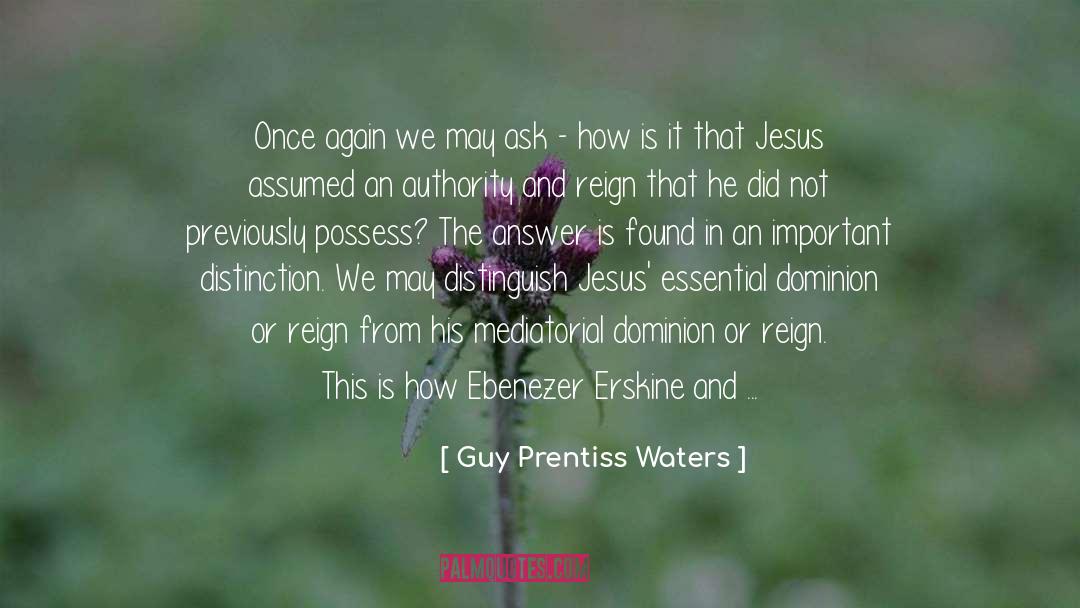
Some odd things were found; among other things the skeleton of an ourang-outang which disappeared from the Jardin des Plantes in 1800, a disappearance probably connected with the famous and incontestable appearance of the devil in the Rue des Bernardins in the last year of the eighteenth century. The poor devil finally drowned himself in the sewer. ~ Victor Hugo
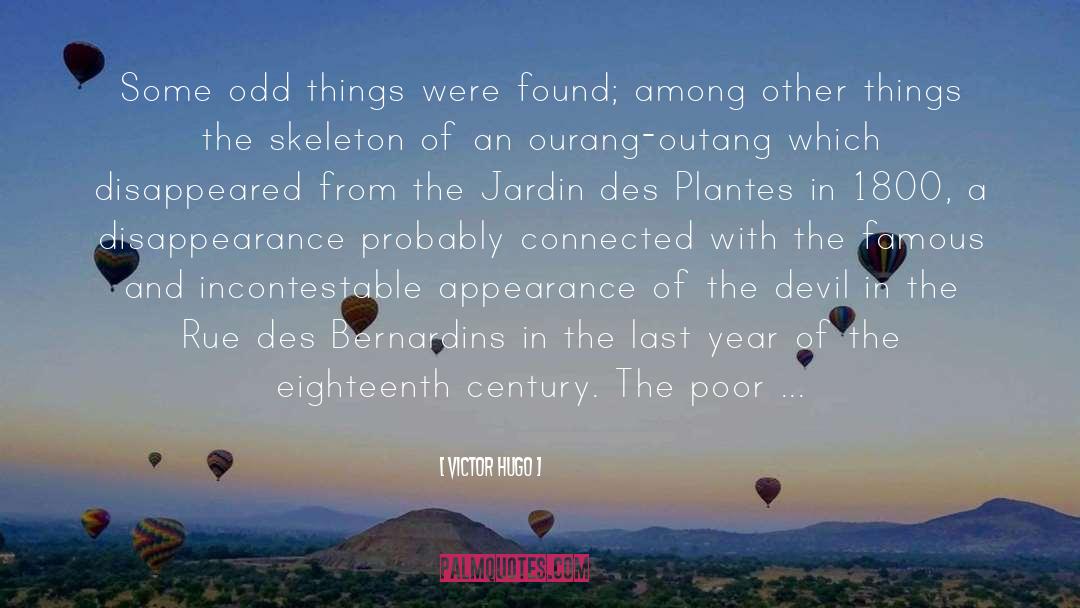
We've inherited many ideas about writing that emerged in the eighteenth century, especially an interest in literature as both an expression and an exploration of the self. This development - part of what distinguishes the "modern" from the "early modern" - has shaped the work of many of our most celebrated authors, whose personal experiences indelibly and visibly mark their writing. It's fair to say that the fiction and poetry of many of the finest writers of the past century or so - and I'm thinking here of Conrad, Proust, Lawrence, Joyce, Woolf, Kafka, Plath, Ellison, Lowell, Sexton, Roth, and Coetzee, to name but a few - have been deeply autobiographical. The link between the life and the work is one of the things we're curious about and look for when we pick up the latest book by a favorite author. ~ James Shapiro
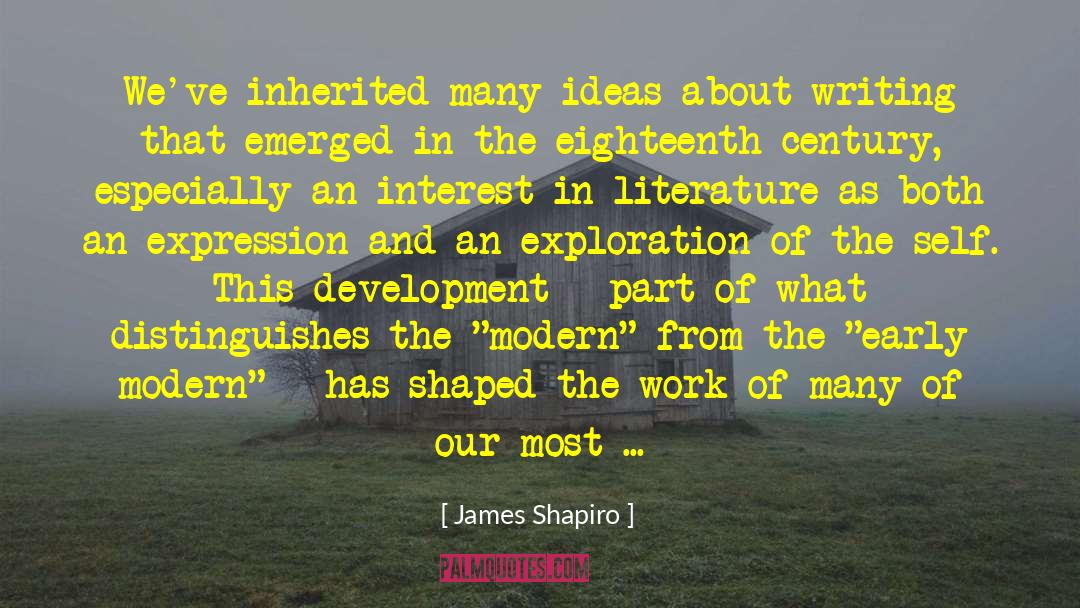
She took a deep breath and it was her eighteenth birthday; it was Jess's wedding and a summer evening at the pool; it was all those hundreds of times he'd been propped against her dorm building. And it was now, and she wanted to be this sophisticated, Audrey Hepburn-esque girl who gave him a coy smile and sauntered toward him, hips swinging. But this was Tam, and she wasn't sophisticated for crap. ~ Lauren Gilley
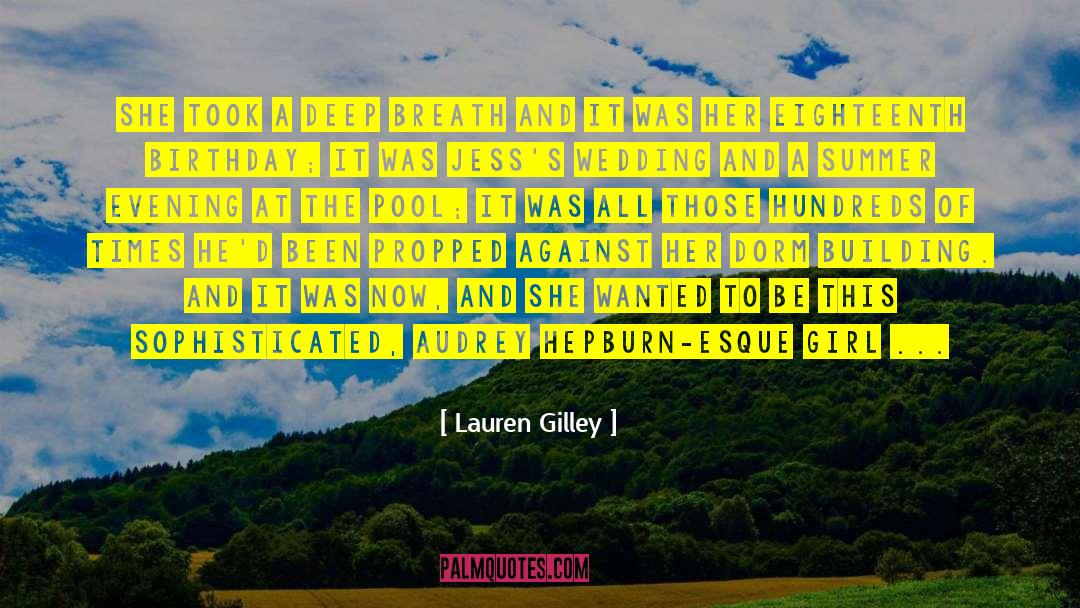
Book reviewing dates only to the eighteenth century, when, for the first time, there were so many books being printed that magazines - they were new, too - started printing essays about them. ~ Jill Lepore
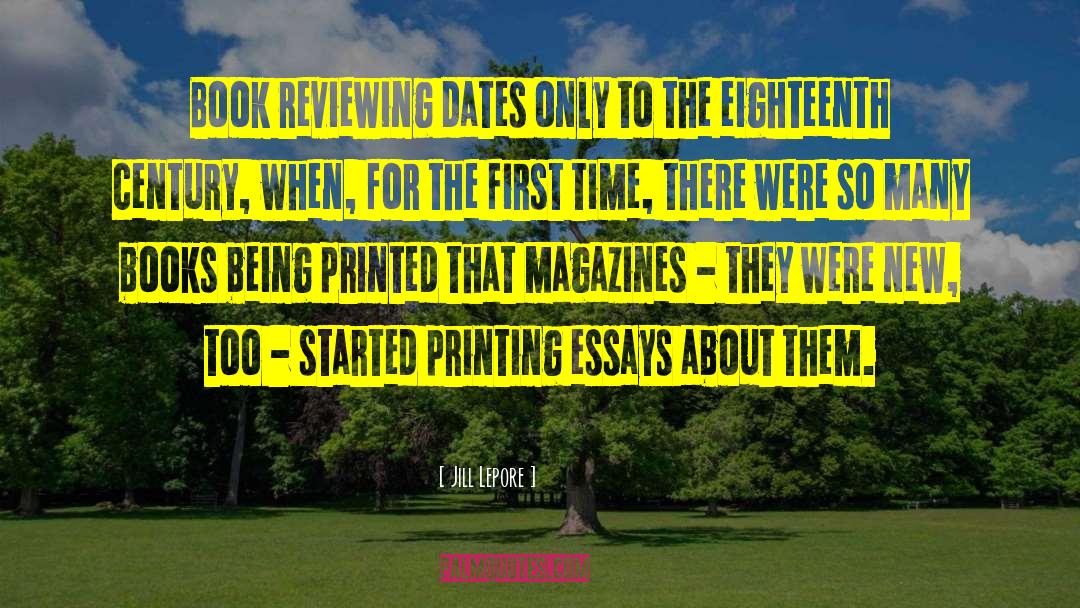
Do you think she's going to hang out your dirty laundry for all to see?"
"How can you say she has sense after what she pulled today? Bah! You don't know what you're talking about."
"What Willow did today was nothing more than an act of rebellion, a way to let off steam and let you know, in the only way she knew how, that your treatment of her is entirely unacceptable."
"Woman, what you need is a man, then maybe you wouldn't be putting your nose in everybody's business."
"Why,Mr. Vaughn, are you applying for the job?" Miriam asked, with an ill-humored smile.
"Hell,no!"
"Then I suggest you leave my personal life out of this. My life is in perfect order, which is more than can be said for yours!"
Owen grunted and took a pull on his pipe.
Well aware of his bold perusal, Miriam attacked her darning as if it were infinitely more engaging than any conversation with the man across the room from her.
Owen wasn't a handsome man by any standards with his bearlike build and ruddy complexion. And heaven knew he wasn't very likeable either. Thus, Miriam was at a complete loss to explain her powerful attraction to him. Good heavens, she thought, I haven't felt so giddy since that time on my eighteenth birthday when Hiriam pulled me behind Aunt Harriet's coachhouse and we... The landlady's face reddened. ~ Charlotte McPherren
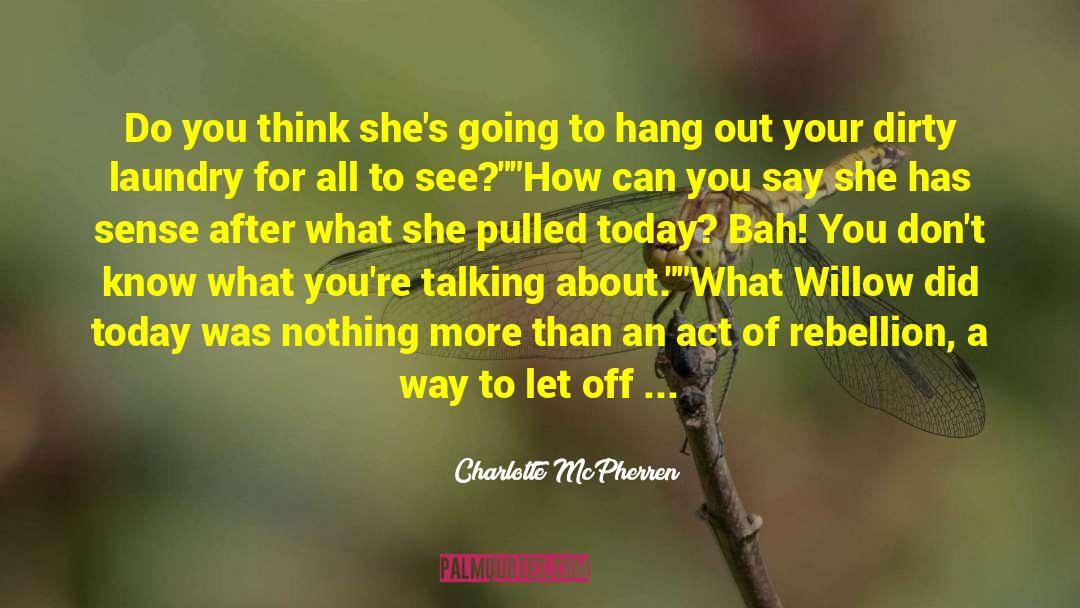
Scottish operative lodges began in the seventeenth century to admit non-operative members as accepted or gentleman masons and that by the early eighteenth century in some lodges the accepted or gentleman masons had gained the ascendancy: those lodges became, in turn speculative lodges, whilst others continued their purely operative nature. The speculative lodges eventually combined to form the Grand Lodge of Scotland in 1736. ~ John Hamill
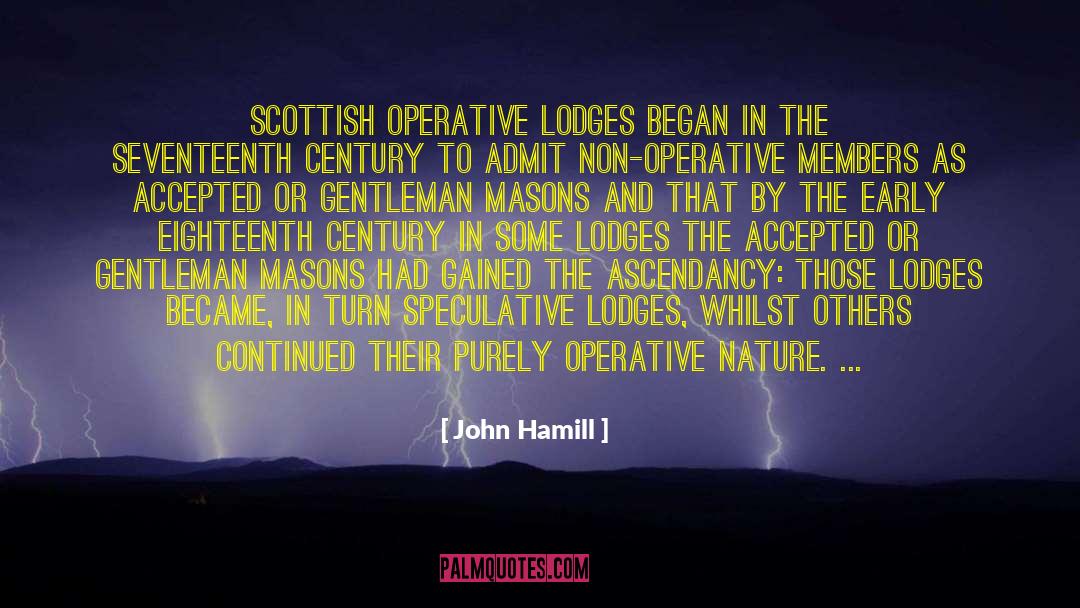
The expression 'to lose one's faith', as one might a purse or a ring of keys, has always seemed to me rather foolish. It must be one of those sayings of bourgeois piety, a legacy of those wretched priests of the eighteenth century who talked so much.
Faith is not a thing which one 'loses', we merely cease to shape our lives by it. That is why old-fashioned confessors are not far wrong in showing a certain amount of scepticism when dealing with 'intellectual crises', doubtless far more rare than people imagine. An educated man may come by degrees to tuck away his faith in some back corner of his brain, where he can find it again on reflection, by an effort of memory: yet even if he feels a tender regret for what no longer exists and might have been, the term 'faith' would nevertheless be inapplicable to such an abstraction, no more like real faith, to use a very well-worn simile, than the constellation of Cygne is like a swan. ~ Georges Bernanos
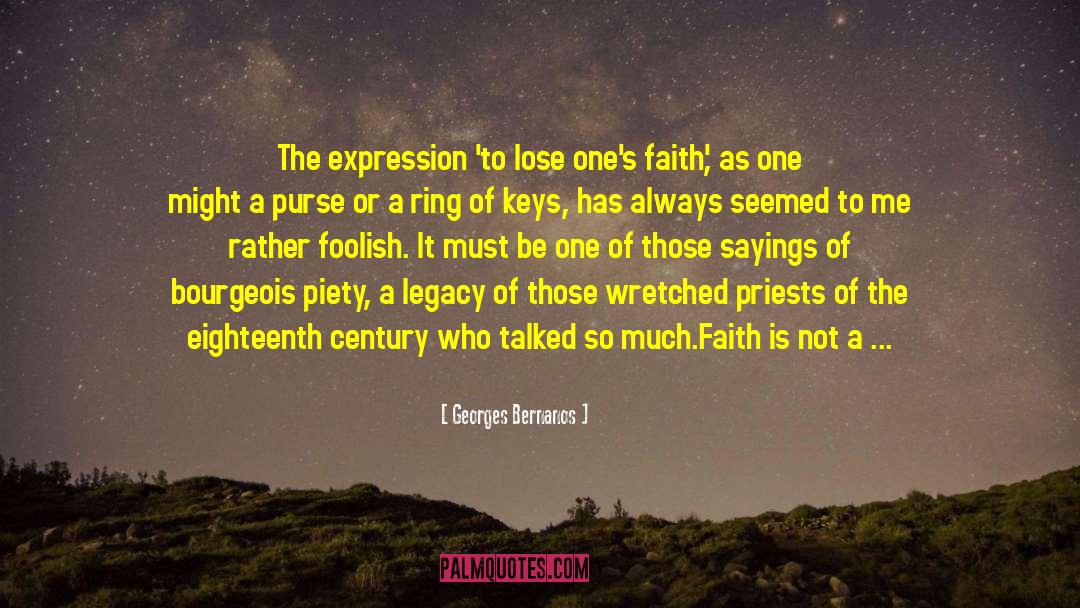
The public execution did not re-establish justice; it reactivated power. In the seventeenth century, and even in the early eighteenth century, it was not, therefore, with all its theatre of terror, a lingering hang-over from an earlier age. Its ruthlessness, its spectacle, its physical violence, its unbalanced play of forces, its meticulous ceremonial, its entire apparatus were inscribed in the political functioning of the penal system. ~ Michel Foucault
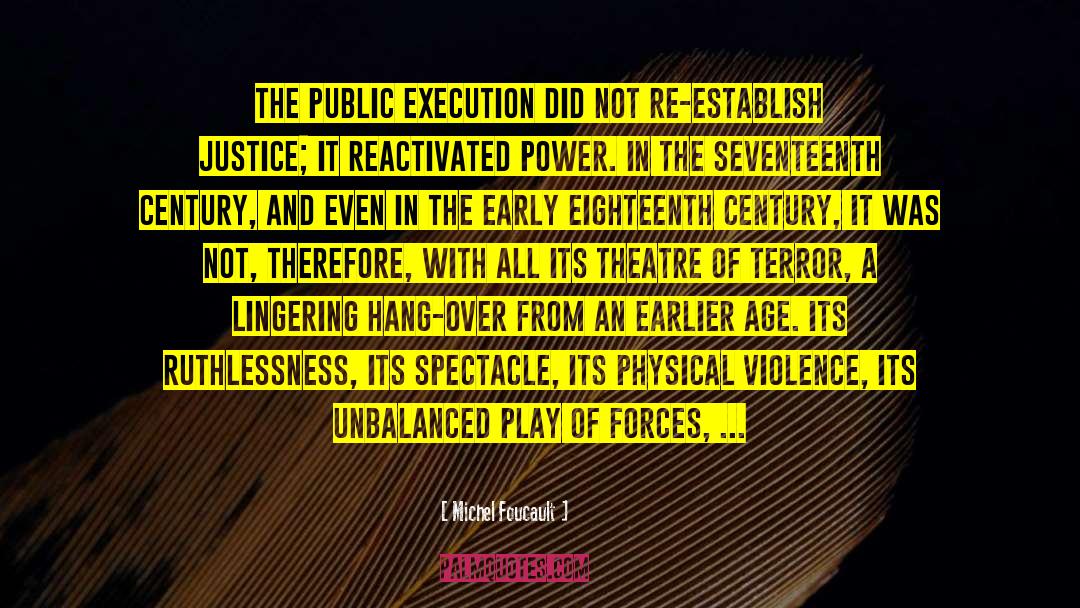
Denmark first responded to the denunciatory cries of the eighteenth century against slavery and the slave-trade. In 1792, by royal order, this traffic was prohibited in the Danish possessions after 1802. ~ W.E.B. Du Bois
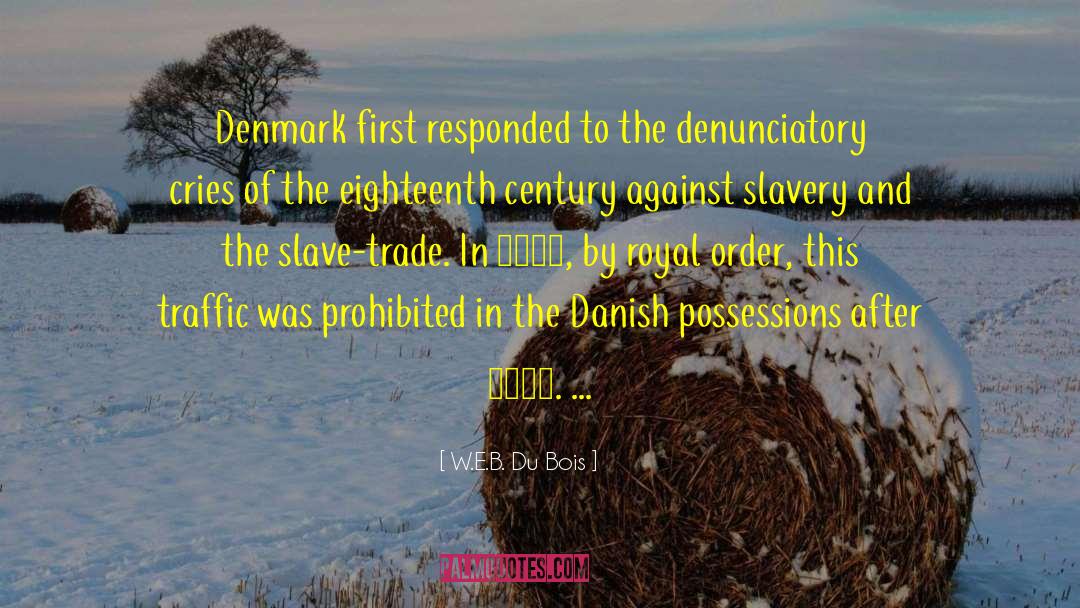
... modern man no longer communicates with the madman [ ... ] There is no common language: or rather, it no longer exists; the constitution of madness as mental illness, at the end of the eighteenth century, bears witness to a rupture in a dialogue, gives the separation as already enacted, and expels from the memory all those imperfect words, of no fixed syntax, spoken falteringly, in which the exchange between madness and reason was carried out. The language of psychiatry, which is a monologue by reason about madness, could only have come into existence in such a silence. ~ Michel Foucault
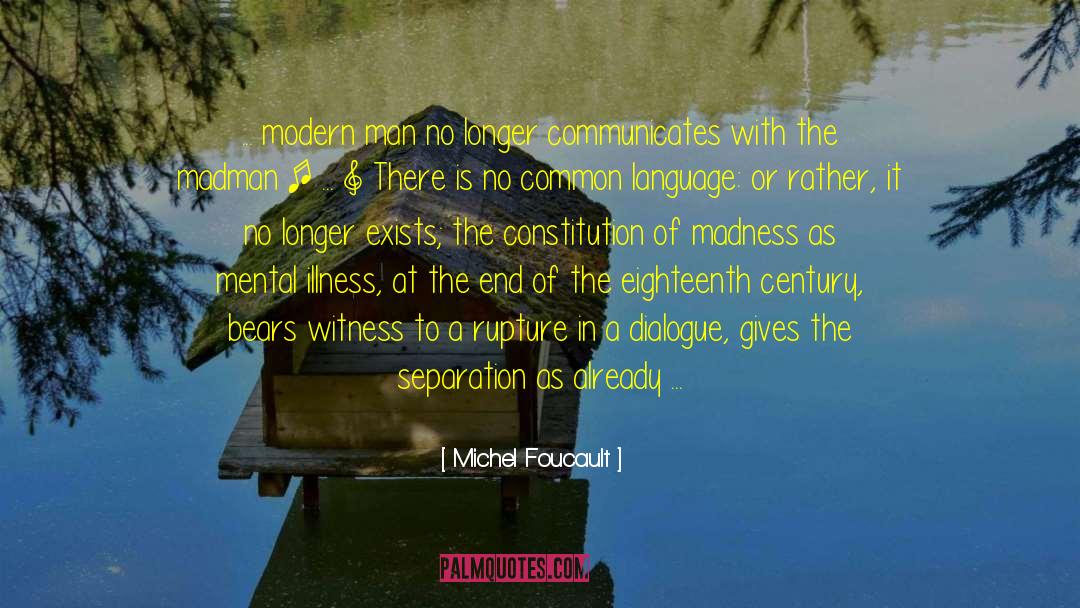
By your eighteenth birthday you're supposed to know. They're supposed to tell you. Splicer. True Born. Laster. ~ L.E. Sterling
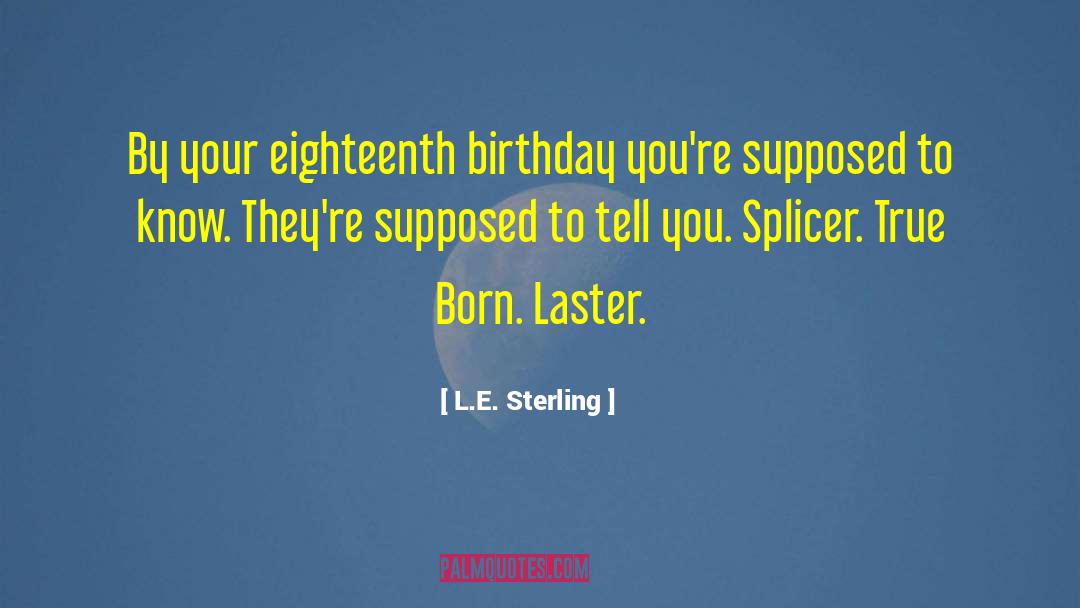
But before we cue the brass section to blare "The Stars and Stripes Forever," it might be worth taking another moment of melancholy silence to mourn the thwarted reconciliation with the mother country and what might have been. Anyone who accepts the patriots' premise that all men are created equal must come to terms with the fact that the most obvious threat to equality in eighteenth-century North America was not taxation without representation but slavery. Parliament would abolish slavery in the British Empire in 1833, thirty years before President Lincoln's Emancipation Proclamation. A return to the British fold in 1776 might have freed American slaves three decades sooner, which is what, a generation and a half? Was independence for some of us more valuable than freedom for all of us? As the former slave Frederick Douglass put it in an Independence Day speech in 1852, "This is your Fourth of July, not mine. ~ Sarah Vowell
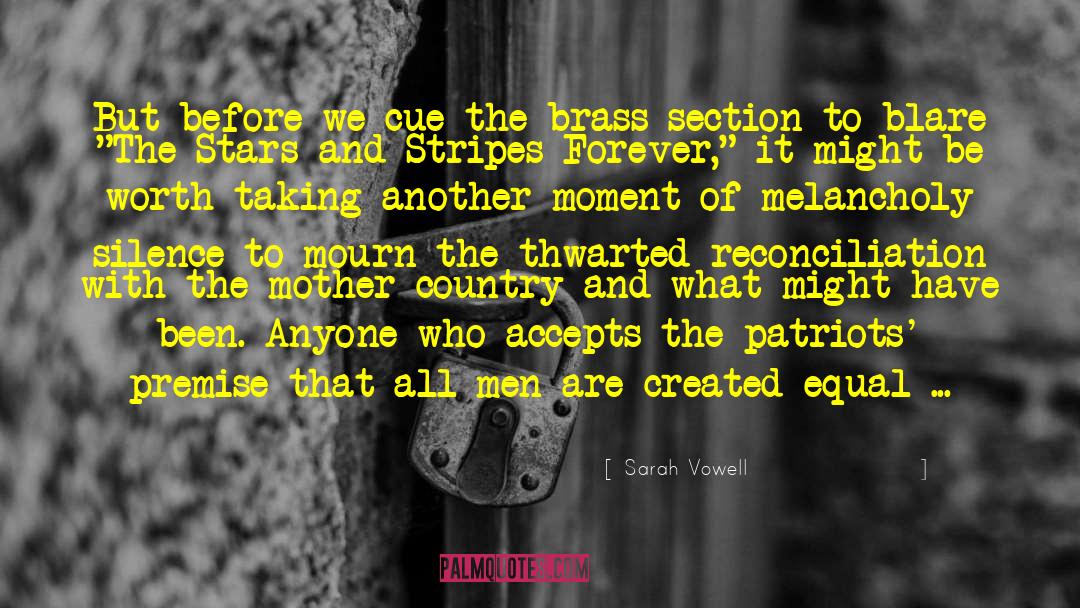
Imagination is not, as some poets have thought, simply synonymous with good. It may be either good or evil. As long as art remained primarily mimetic, the evil which imagination could do was limited by nature. Again, as long as it was treated as an amusement, the evil which it could do was limited in scope. But in an age when the connection between imagination and figuration is beginning to be dimly realized, when the fact of the directionally creator relation is beginning to break through into consciousness, both the good and the evil latent in the working of imagination begin to appear unlimited. We have seen in the Romantic movement an instance of the way in which the making of images may react upon the collective representations. It is a fairly rudimentary instance, but even so it has already gone beyond the dreams and responses of a leisured few. The economic and social structure of Switzerland is noticeably affected by its tourist industry, and that is due only in part to increased facilities of travel. It is due not less to the condition that (whatever may be said about their 'particles') the mountains which twentieth-century man sees are not the mountains which eighteenth-century man saw.
It may be objected that this is a very small matter, and that it will be a long time before the imagination of man substantially alters those appearances of nature with which his figuration supplies him. But then I am taking the long view. Even so, we need not be too confi ~ Owen Barfield
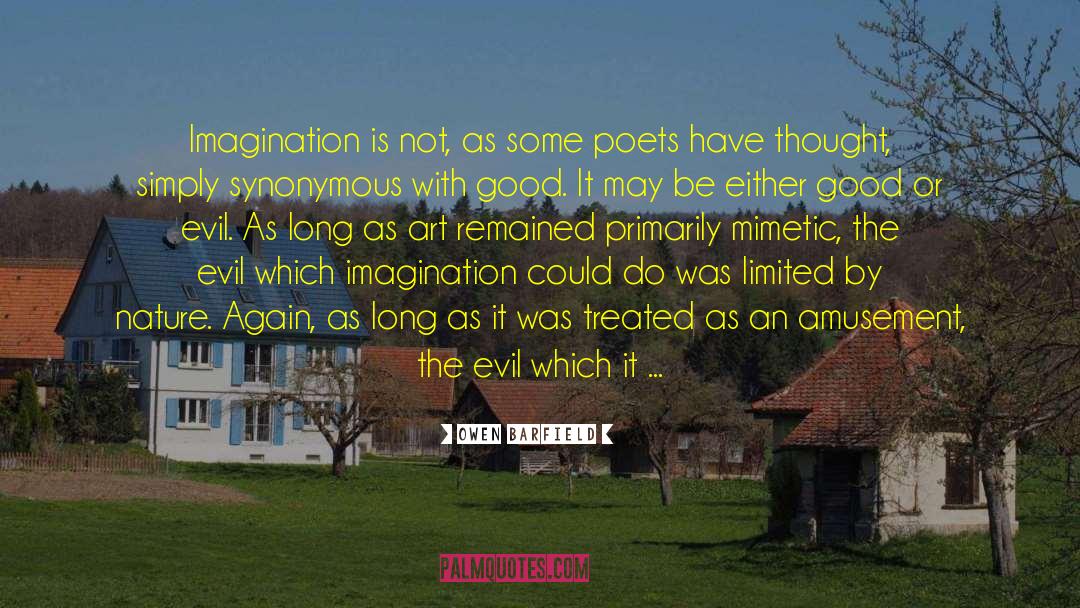
Then humming thrice, he assumed a most ridiculous solemnity of aspect, and entered into a learned investigation of the nature of stink...The French were pleased with the putrid effluvia of animal food; and so were the Hottentots in Africa, and the Savages in Greenland; and that the Negroes on the coast of Senegal would not touch fish till it was rotten; strong presumptions in favour of what is generally called stink, as those nations are in a state of nature, undebauched by luxury, unseduced by whim and caprice: that he had reason to believe the stercoraceous flavour, condemned by prejudice as a stink, was, in fact, most agreeable to the organs of smelling; for, that every person who pretended to nauseate the smell of another's excretions, snuffed up his own with particular complacency... ~ Tobias Smollett
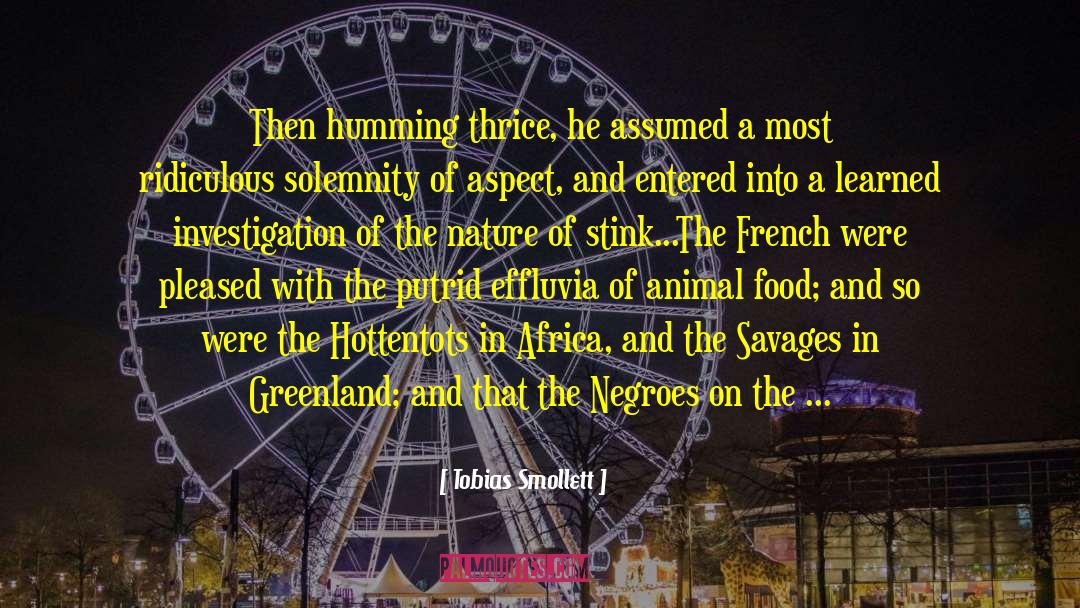
However, the sciences of society and of history retained their old subservient relation to metaphysics for a long time - well into the eighteenth century. ~ Wilhelm Dilthey
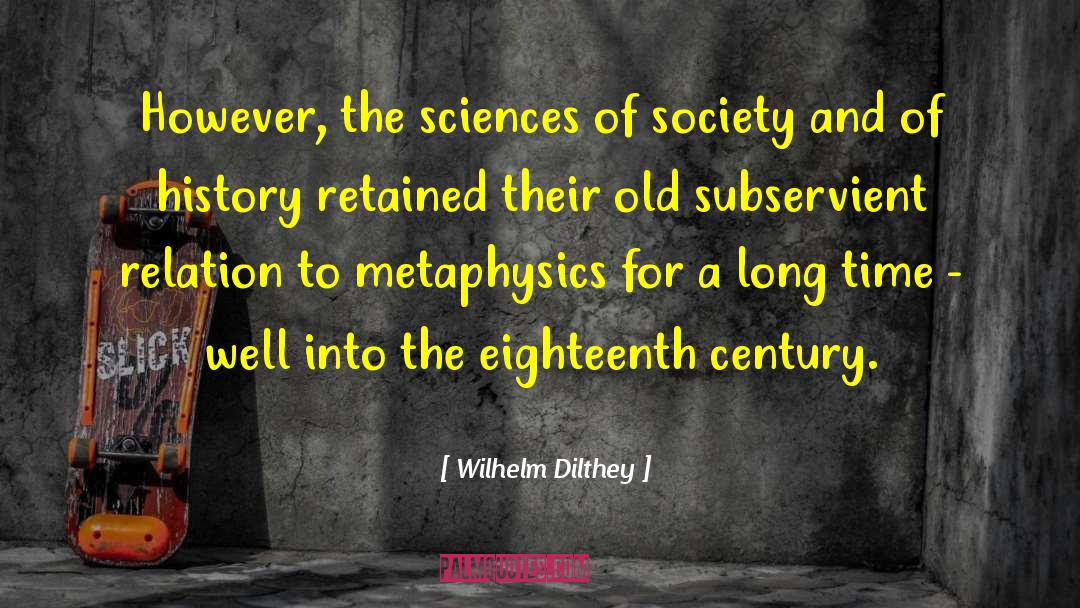
The word personality didn't exist in English until the eighteenth century, and the idea of "having a good personality" was not widespread until the twentieth. ~ Susan Cain
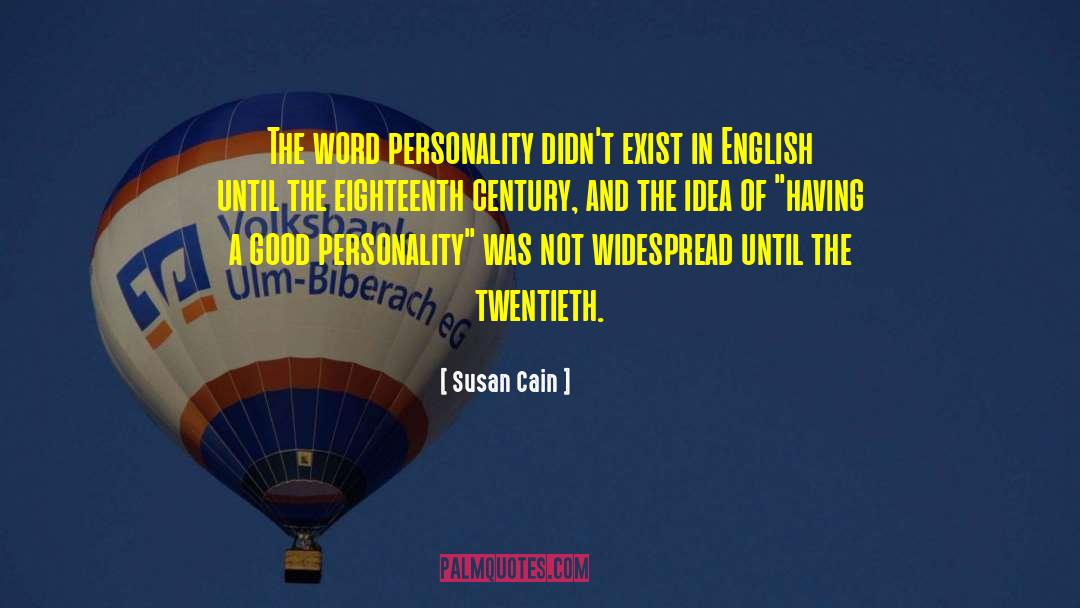
The Maze, that labyrinth of alleys called ginnels and snickets locally - tiny squares, courtyards, nooks and crannies and small warehouses that had remained unchanged since the eighteenth century. ~ Peter Robinson
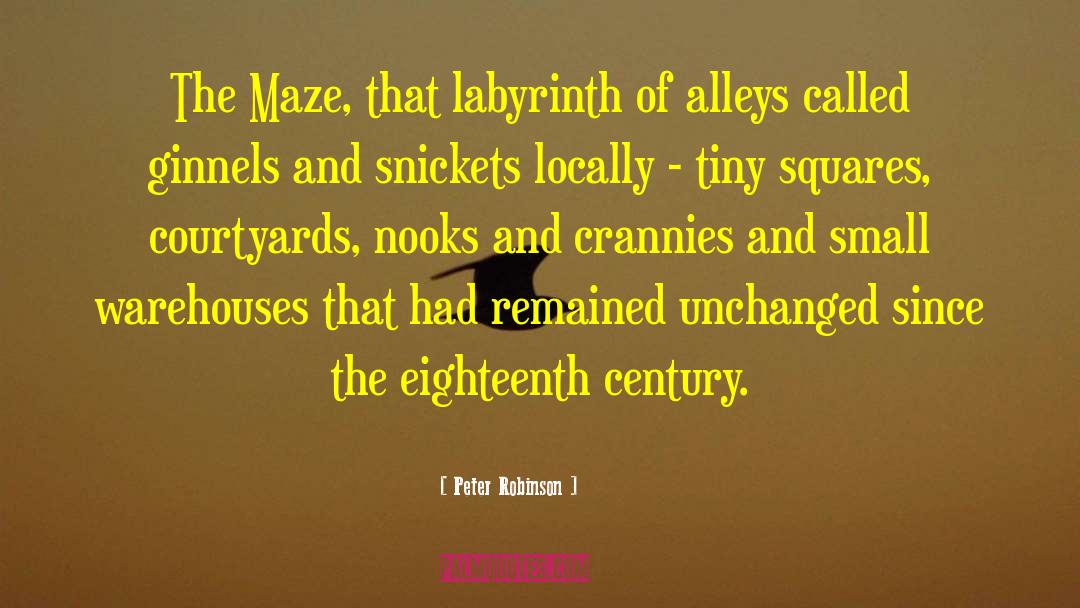
You can't understand Twenty-first-Century Politics with an Eighteenth-Century Brain. ~ George Lakoff
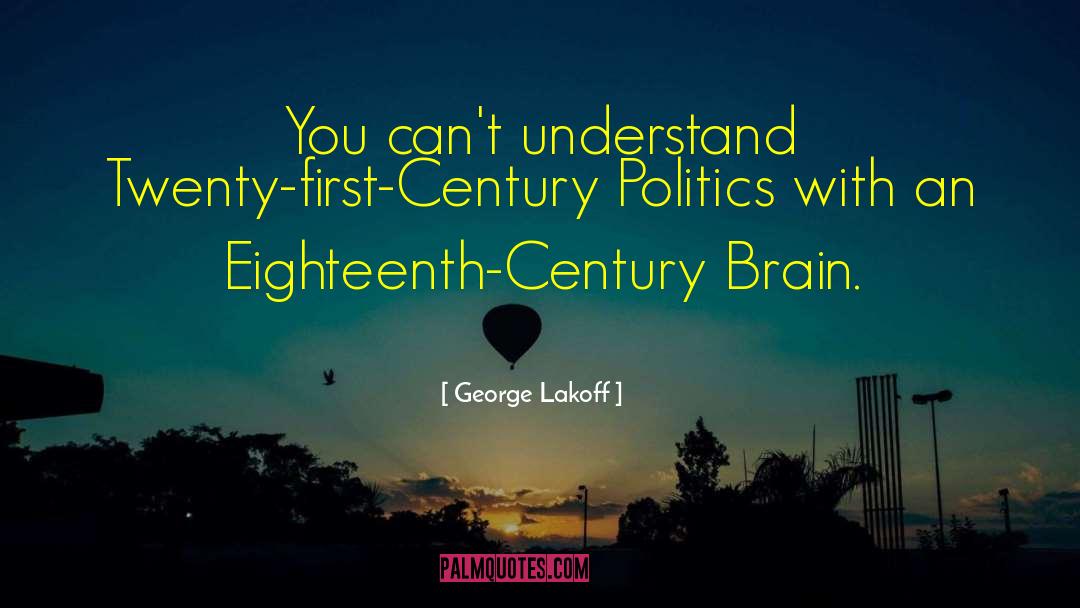
To narrow natural rights to such neat slogans as "liberty, equality, fraternity" or "life, liberty, property," . . . was to ignore the complexity of public affairs and to leave out of consideration most moral relationships. . . .
Burke appealed back beyond Locke to an idea of community far warmer and richer than Locke's or Hobbes's aggregation of individuals. The true compact of society, Burke told his countrymen, is eternal: it joins the dead, the living, and the unborn. We all participate in this spiritual and social partnership, because it is ordained of God. In defense of social harmony, Burke appealed to what Locke had ignored: the love of neighbor and the sense of duty. By the time of the French Revolution, Locke's argument in the Second Treatise already had become insufficient to sustain a social order. . . .
The Constitution is not a theoretical document at all, and the influence of Locke upon it is negligible, although Locke's phrases, at least, crept into the Declaration of Independence, despite Jefferson's awkwardness about confessing the source of "life, liberty, and the pursuit of happiness."
If we turn to the books read and quoted by American leaders near the end of the eighteenth century, we discover that Locke was but one philosopher and political advocate among the many writers whose influence they acknowledged. . . .
Even Jefferson, though he had read Locke, cites in his Commonplace Book such juridical authorities ~ Russell Kirk

He moved on from Anatole France to the eighteenth-century philosophers, though not to Rousseau. Perhaps this was because one side of him - the side easily moved by passion - was too close to Rousseau. Instead, he approached the author of 'Candide', who was closer to another side of him - the cool and richly intellectual side.
At twenty-nine, life no longer held any brightness for him, but Voltaire supplied him with man-made wings.
Spreading these man-made wings, he soared with ease into the sky. The higher he flew, the farther below him sank the joys and sorrows of a life bathed in the light of intellect. Dropping ironies and smiles upon the shabby towns below, he climbed through the open sky, straight for the sun - as if he had forgotten about that ancient Greek who plunged to his death in the ocean when his man-made wings were singed by the sun. ~ Ryunosuke Akutagawa

His [Francisco Goya's] debt to the Christianity of the eighteenth century is contained in the idea that politics was just adopting from the Gospels: the conviction that man has a right to justice. Such a statement would seem utterly conceited to a Roman, who would doubtless have looked upon the Disasters as we look upon photographs of the amphitheatre ... But if Goya thought that man has not come onto the earth to be cut to pieces he thought that he must have come here for something. Is it to live in joy and honour? Not only that; it is to come to terms with the world. And the message he never ceased to preach, a message underlined by war, is that man only comes to terms with the world by blinding himself with childishness. ~ Andre Malraux
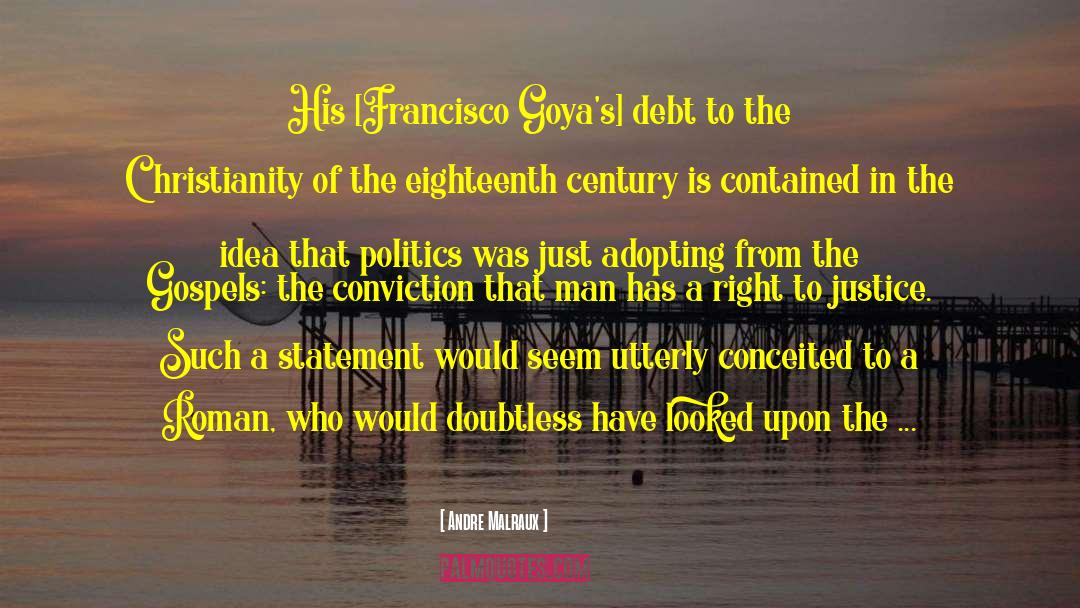
It's hard to explain, but it's related to me know that for every moment of beauty this place gives me, I probably miss a thousand more. And I want them all. I swear I'd live on the dunes if I could. I was born out of my time. I should have been around during the end of the eighteenth century, when the Romantic Era kicked off, and writers and artists were obsessed with nature: the ocean, the mountains, the sky. And they believed in following their own path, experimenting, not blindly obeying rules.
I found a quote by Henry David Thoreau- "I wanted to live deep and suck out all the marrow of life" ... It made me cry. Urgency is so beautiful. ~ Kirsty Eagar

A policing of sex: that is, not the rigor of a taboo, but the necessity of regulating sex through useful and public discourses. A few examples will suffice. One of the great innovations in the techniques of power in the eighteenth century was the emergence of "population" as an economic and political problem: population as wealth, population as manpower or labor capacity, population balanced between its own growth and the resources it commanded. Governments perceived that they were not dealing simply with subjects, or even with a "people," but with a "population," with its specific phenomena and its peculiar variables: birth and death rates, life expectancy, fertility, state of health, frequency of illnesses, patterns of diet and habitation. ~ Michel Foucault
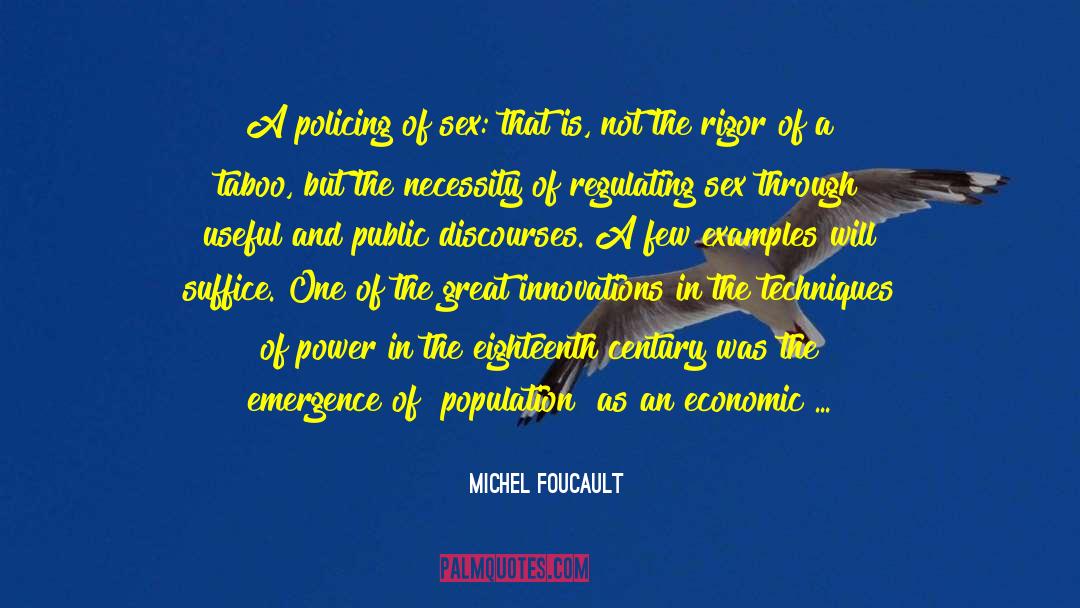
We criticize Americans for not being able either to analyse or conceptualize. But this is a wrong-headed critique. It is we who imagine that everything culminates in transcendence, and that nothing exists which has not been conceptualized. Not only do they care little for such a view, but their perspective is the very opposite: it is not conceptualizing reality, but realizing concepts and materializing ideas, that interests them. The ideas of the religion and enlightened morality of the eighteenth century certainly, but also dreams, scientific values, and sexual perversions. Materializing freedom, but also the unconscious. Our phantasies around space and fiction, but also our phantasies of sincerity and virtue, or our mad dreams of technicity. Everything that has been dreamt on this side of the Atlantic has a chance of being realized on the other. They build the real out of ideas. We transform the real into ideas, or into ideology. ~ Jean Baudrillard
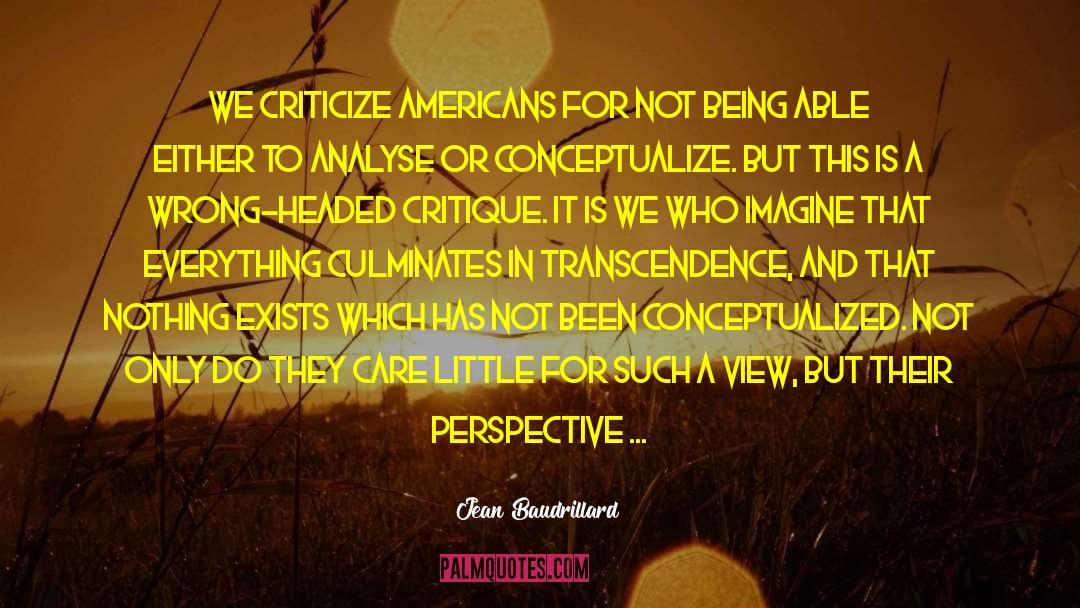
Before science, before the eighteenth century, religion answered the questions, and so in the nineteenth century for instance there was a real jostling between science and religion over the truth and this is why Darwin was so controversial. ~ Nell Irvin Painter

Just as the invention of new forms of industrial automation in the eighteenth and nineteenth centuries had the paradoxical effect of turning more and more of the world's population into full-time industrial workers, so has all the software designed to save us from administrative responsibilities in recent decades ultimately turned us all into part or full-time administrators. ~ David Graeber
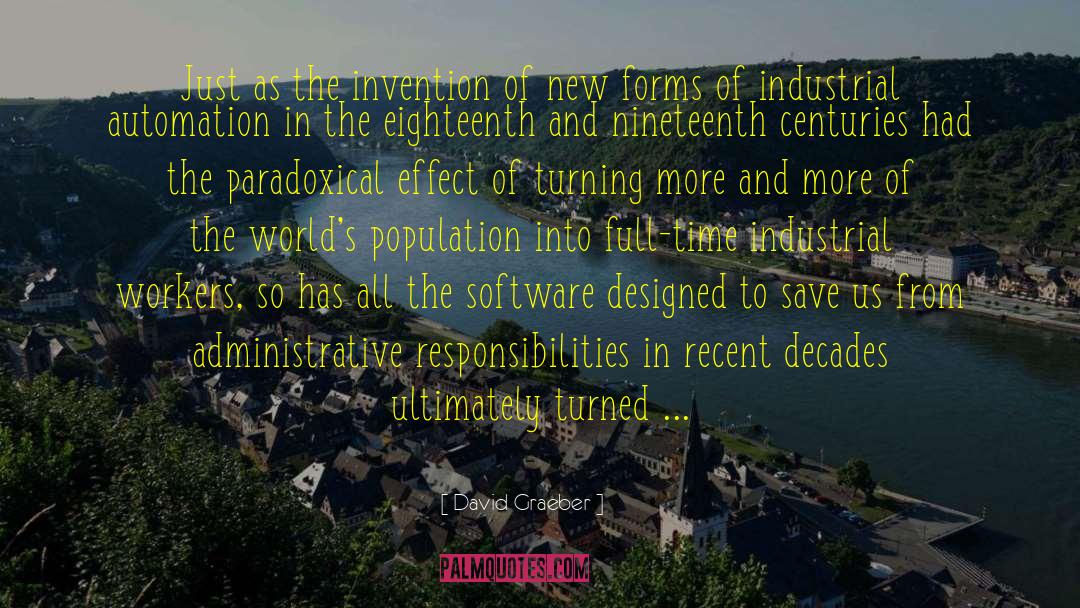
In the eighteenth and nineteenth centuries, print put forward a definition of intelligence that gave priority to the objective, rational use of the mind and at the same time encouraged forms of public discourse with serious, logically ordered content. It is no accident that the Age of Reason was coexistent with that growth of a print culture, first in Europe and then in America. ~ Neil Postman
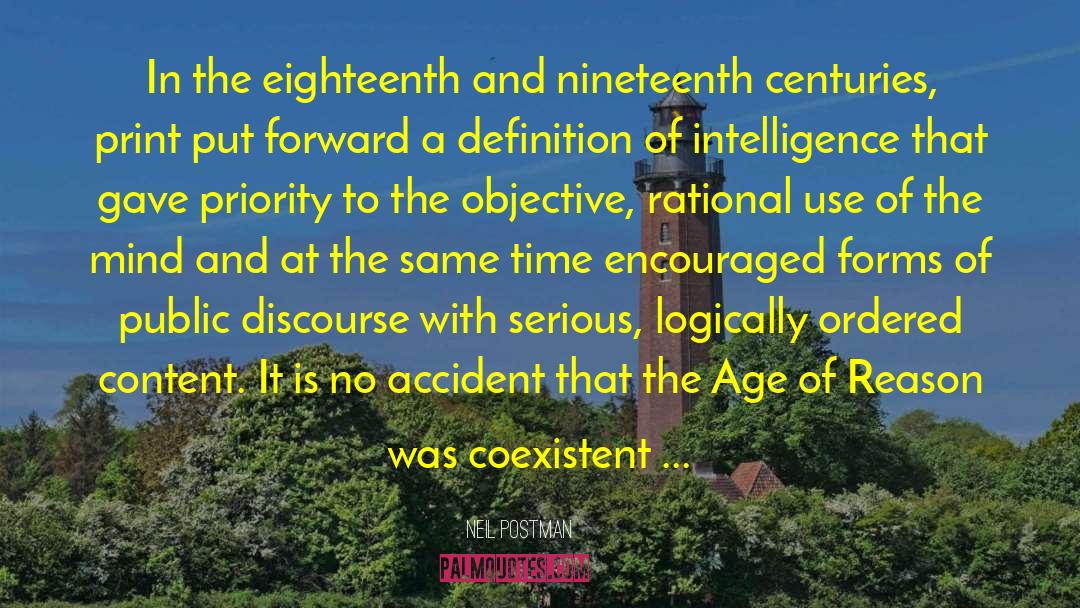
According to the historian William H. McNeil, European churches did not have pews until sometime in the eighteenth century. People stood or milled around, creating a very different dynamic than we find in today's churches, where people are expected to spend most of their time sitting. ~ Barbara Ehrenreich
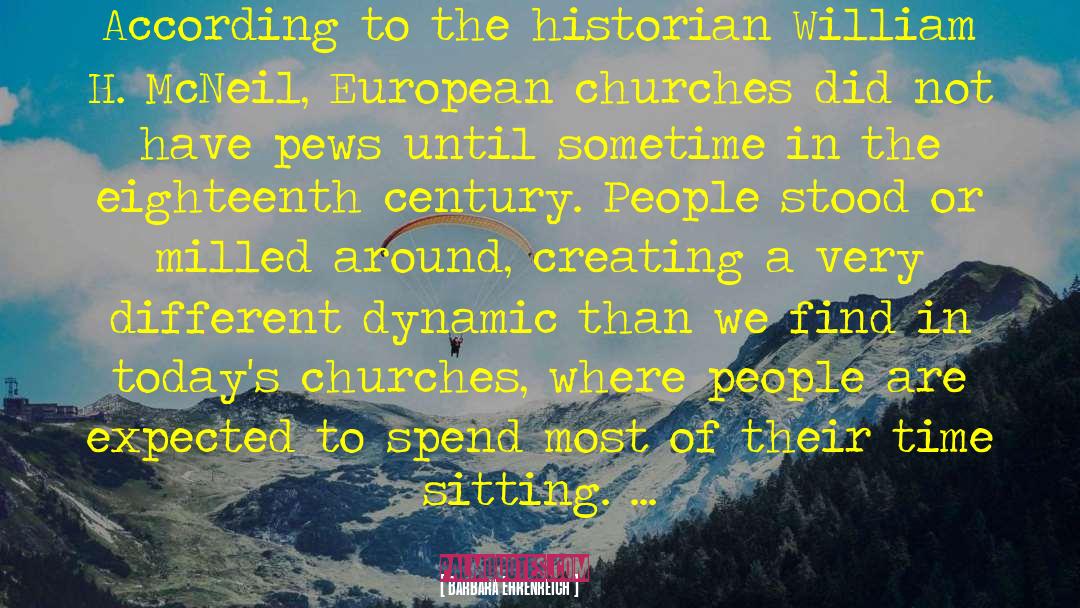
Without competition we would be clinging to the clumsy antiquated processes of farming and manufacture and the methods of business of long ago, and the twentieth would be no further advanced than the eighteenth century. ~ William McKinley
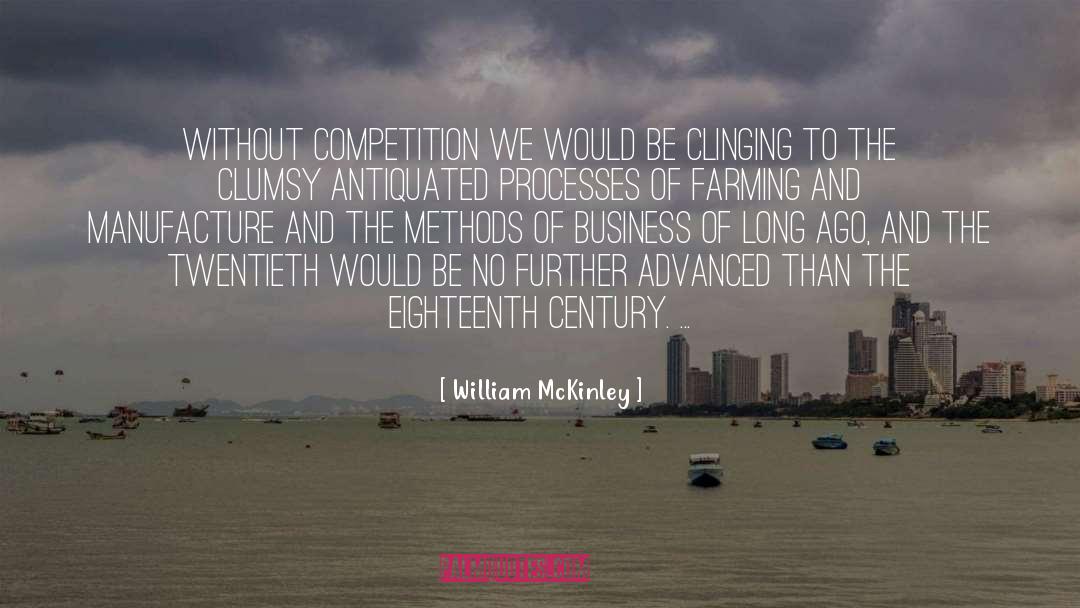
Towards the end of the eighteenth century the industrial-financial revolution began. ~ Ralph Adams Cram
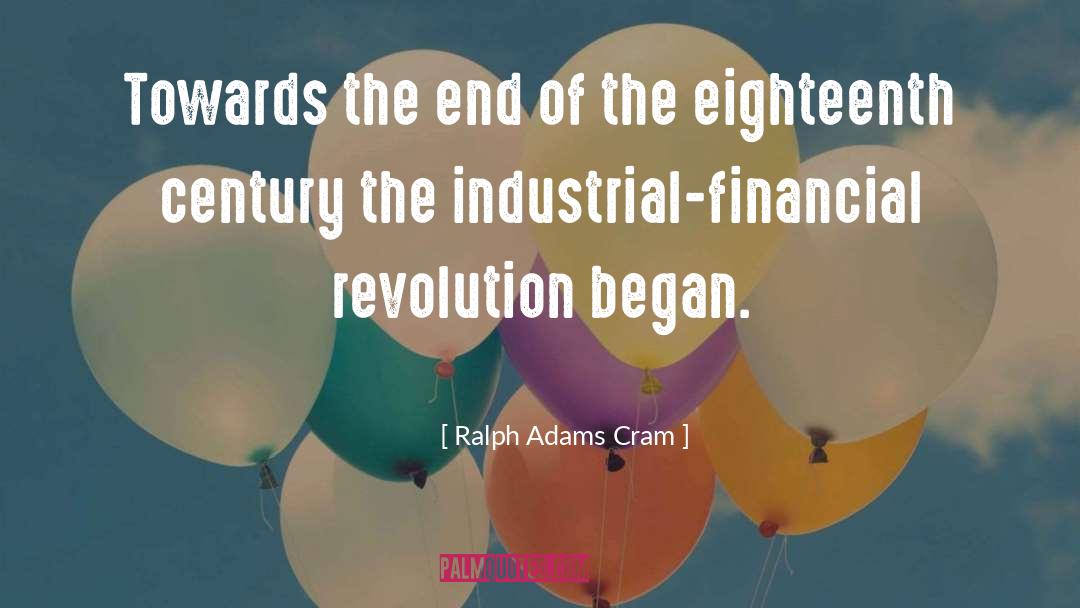
There are many things that make this book fiction, but the roles women play within it are not. The women of the eighteenth century were met with opposition. They had to fight endlessly. Their work was silenced, their contributions ignored, and many of their stories are forgotten today.
Nevertheless, they persisted. ~ Mackenzi Lee
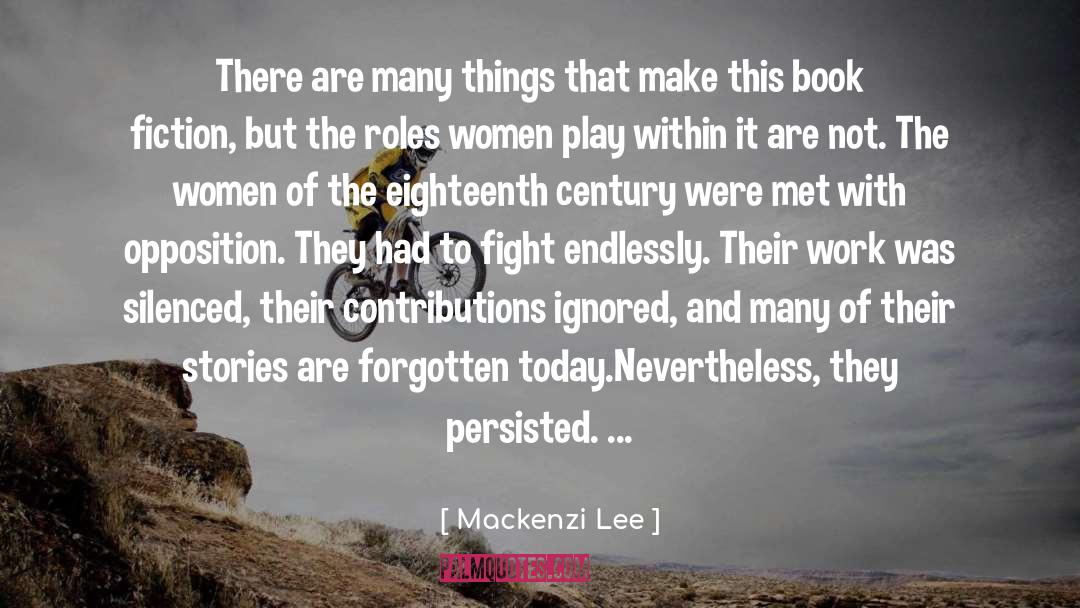
Ruggles told my father what he did because it is not a good thing to belong to the seventeenth or eighteenth centuries in the twentieth. Or really, because it is not good to have taken one's public-school's ethical system seriously. I am really, sir, the English public schoolboy. That's an eighteenth-century product. What with ~ Ford Madox Ford
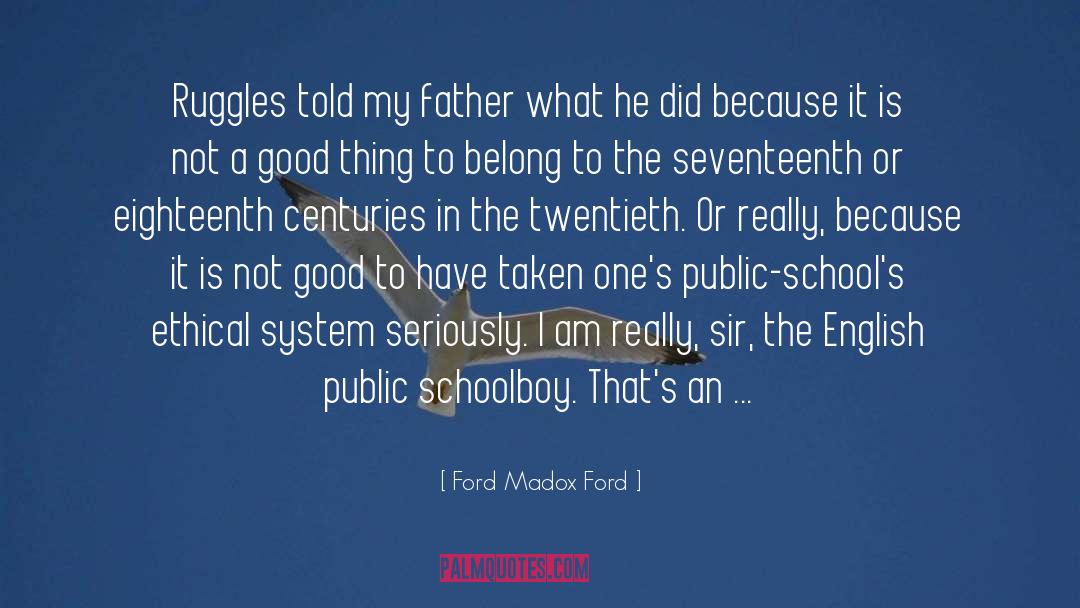
Kant was right; morality did in the eighteenth century, as a matter of historical fact, presuppose something very like the teleological scheme of God, freedom and happiness as the final crown of virtue which Kant propounds. Detach morality from that framework and you will no longer have morality; or, at the very least, you will have radically transformed its character. ~ Alasdair MacIntyre
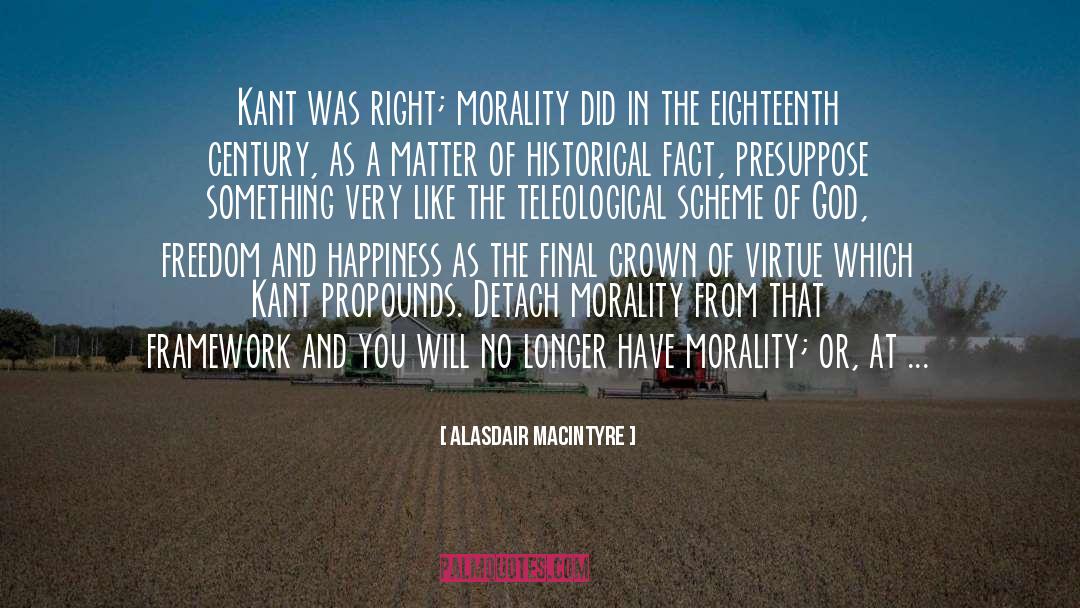
Lord Bolingbroke, who was an eighteenth-century political philosopher, called history "philosophy taught with examples. ~ David McCullough
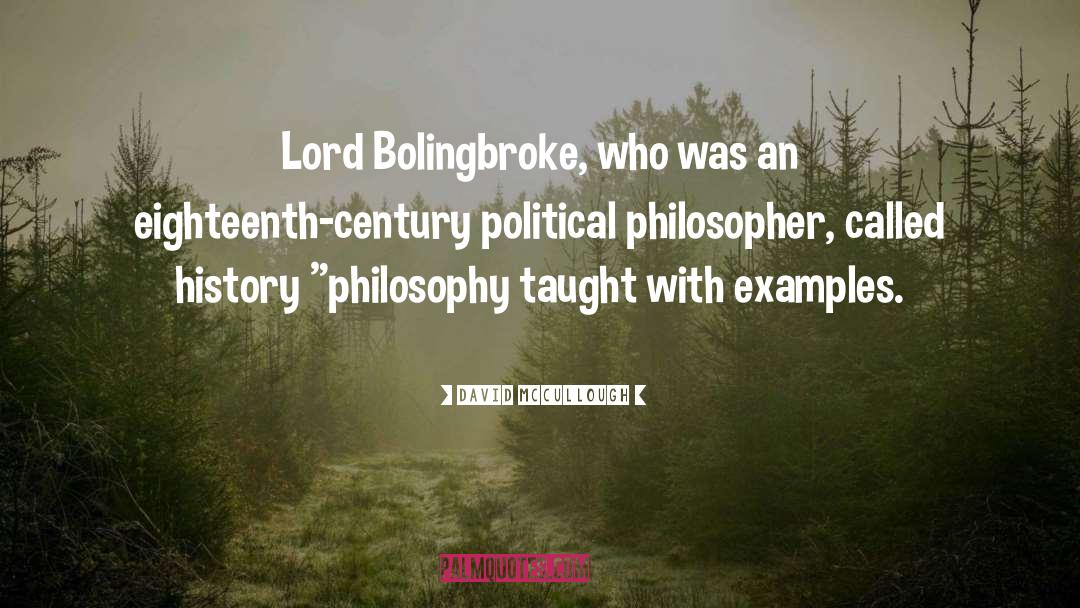
Today's date, the eighteenth of May, should sometime become an occasion of great international celebration, for on this day ten years ago the first Peace Conference opened at The Hague. ~ Fredrik Bajer
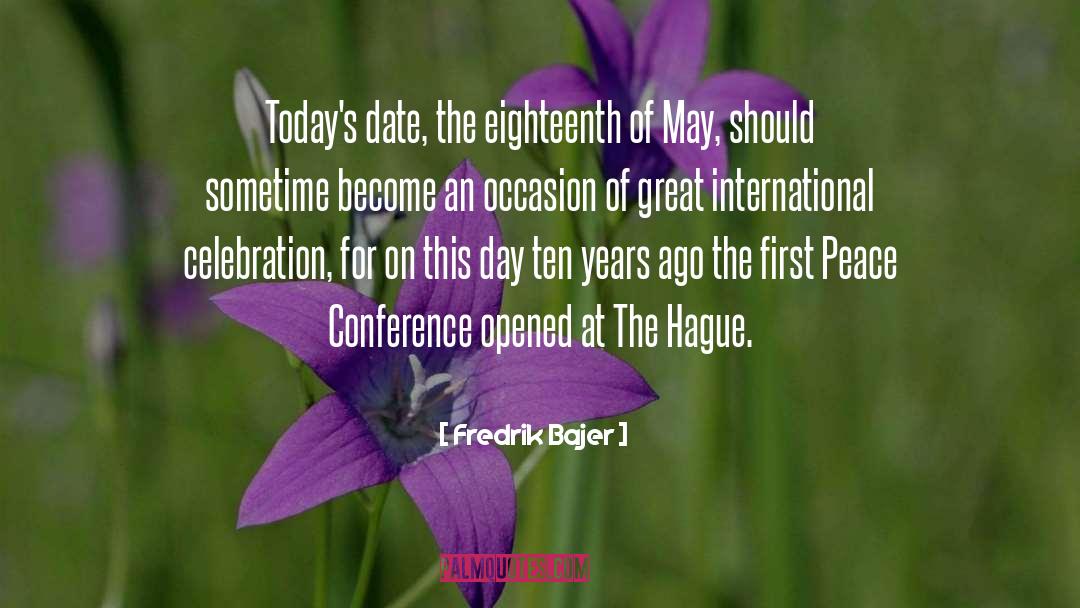
if a theorem is geometrically obvious why prove it? This was exactly the attitude taken in the eighteenth century. The result, in the nineteenth century, was chaos and confusion: for intuition, unsupported by logic, habitually assumes that everything is much nicer behaved than it really is. Good ~ Ian Stewart
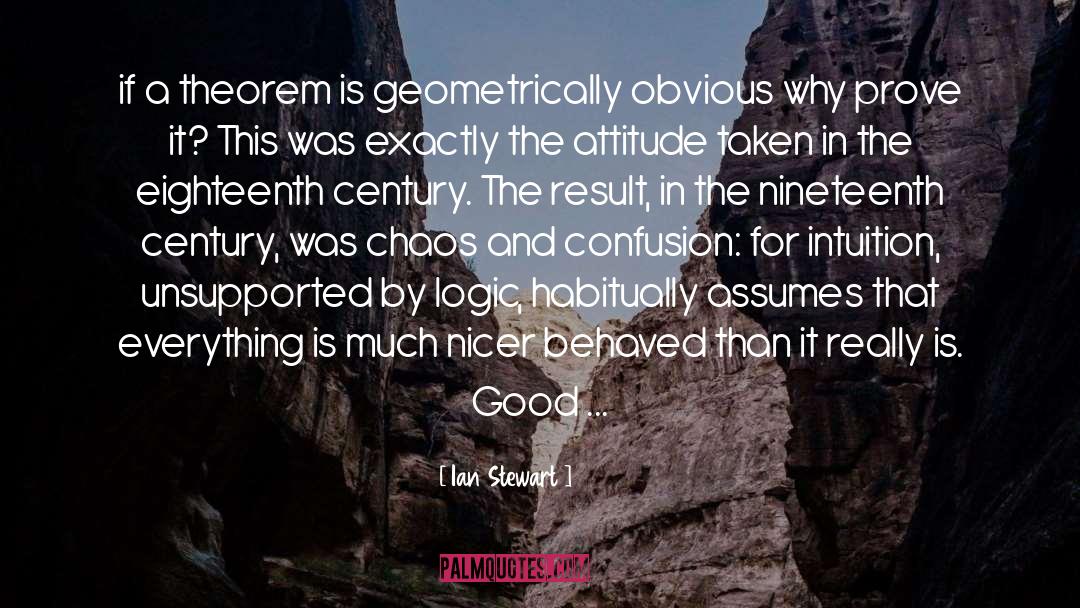
Herder put forward the idea that each of us has an original way of being human. Each person has his or her own "measure" is his way of putting it. This idea has entered very deep into modern consciousness. It is also new. Before the late eighteenth century no one thought that the differences between human beings had this kind of moral significance. ~ Charles Taylor
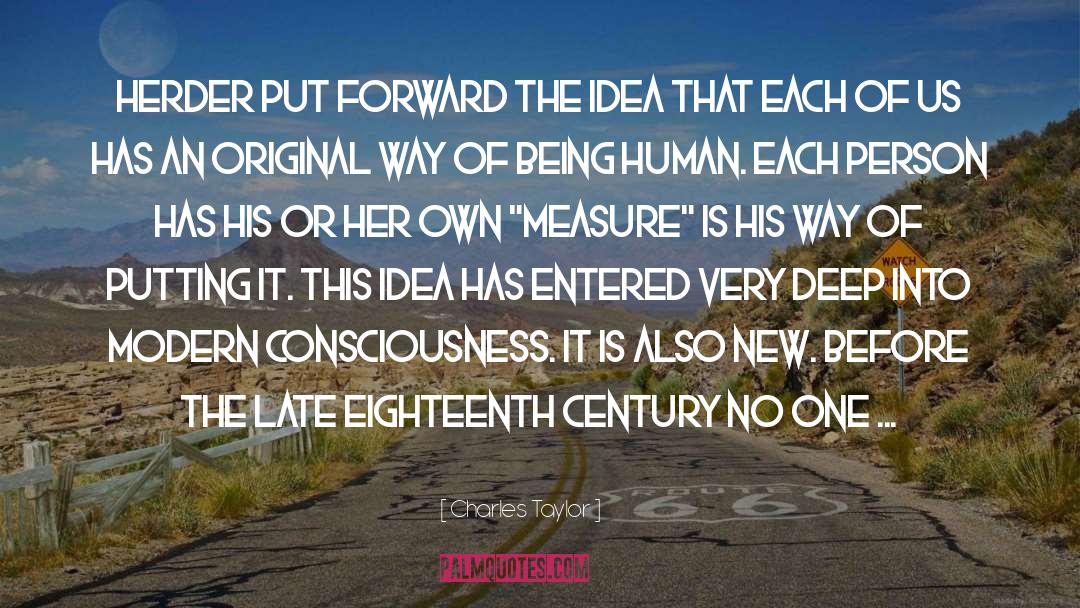
He did. He researched her. Someone told him that she had a special interest in John Milton. It did not take long to discover the century to which this man belonged. A third-year literature student in Beard's college who owed him a favor (for procuring tickets to a Cream concert) gave him an hour on Milton, what to read, what to think. He read "Comus" and was astounded by its silliness. He read through "Lycidas," "Samson Agonistes," and "Il Penseroso" - stilted and rather prissy in parts, he thought. He fared better with "Paradise Lost" and, like many before him, preferred Satan's party to God's. He, Beard, that is, memorized passages that appeared to him intelligent and especially sonorous. He read a biography, and four essays that he had been told were pivotal. The reading took him one long week. He came close to being thrown out of an antiquarian bookshop in the Turl when he casually asked for a first edition of "Paradise Lost." He tracked down a kindly tutor who knew about buying old books and confided to him that he wanted to impress a girl with a certain kind of present, and was directed to a bookshop in Covent Garden where he spent half a term's money on an eighteenth-century edition of "Areopagitica." When he speed-read it on the train back to Oxford, one of the pages cracked in two. He repaired it with Sellotape. ~ Ian McEwan
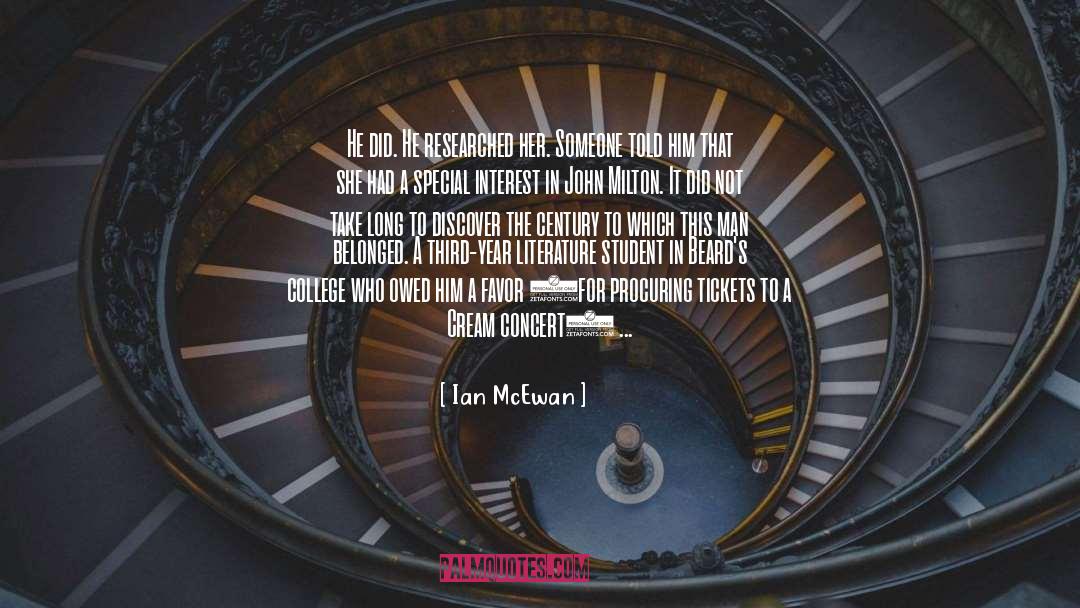
I would just like to mention Robert Houdin who in the eighteenth century invented the vanishing birdcage trick and the theater matinee - may he rot and perish. Good afternoon. ~ Orson Welles
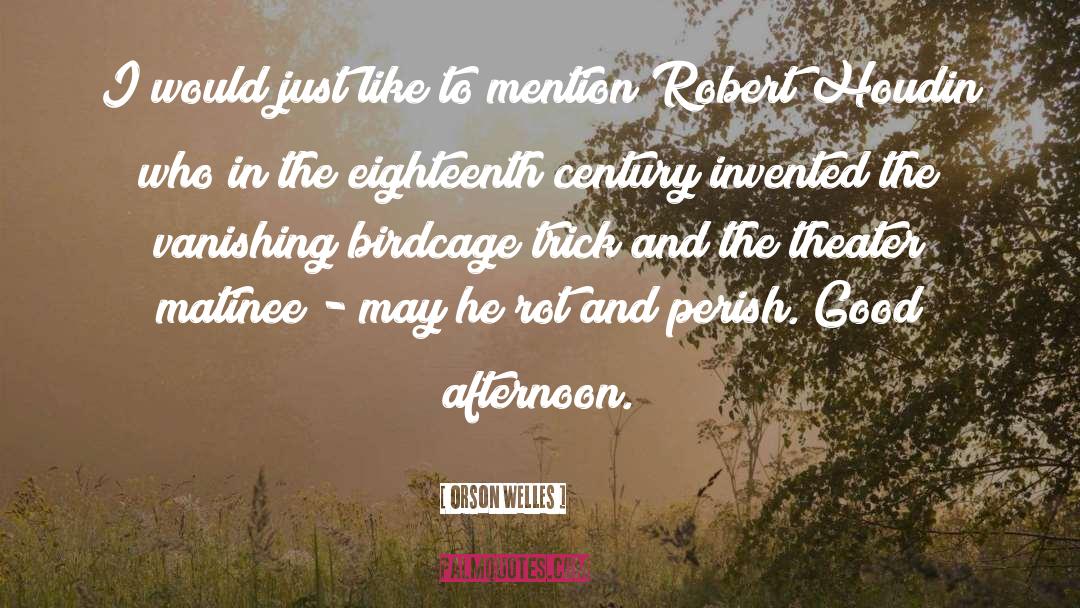
In an age of widespread communication and accountability, people expect political participation and accountability much more than they did in the eighteenth, nineteenth, and early twentieth centuries. The only way the demand for meaningful political participation and choice can be suppressed is to constrain liberty - Larry Diamond, Developing Democracy: Toward Consolidation (Baltimore: Johns Hopkins University Press, 1999), Chapter 1 ('Defining and Developing Democracy'). p. 4 ~ Larry Diamond
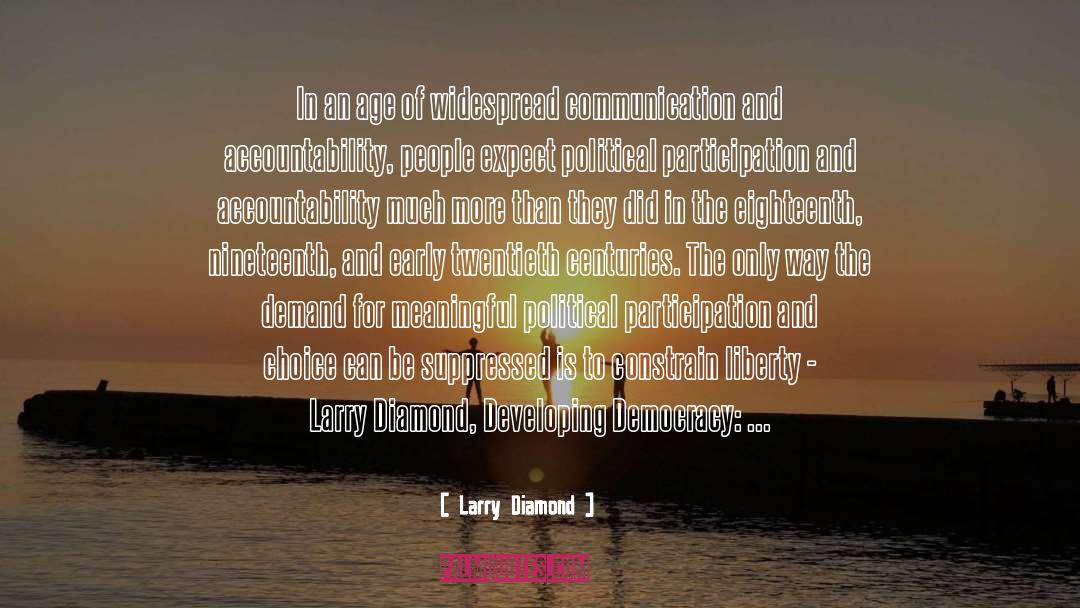
Before the rise of the nation-state, between the eighteenth and twentieth centuries, the world was mostly tribal. Tribes were united by language, religion, blood, and belief. They feared other tribes and often warred against them. ~ Robert Reich
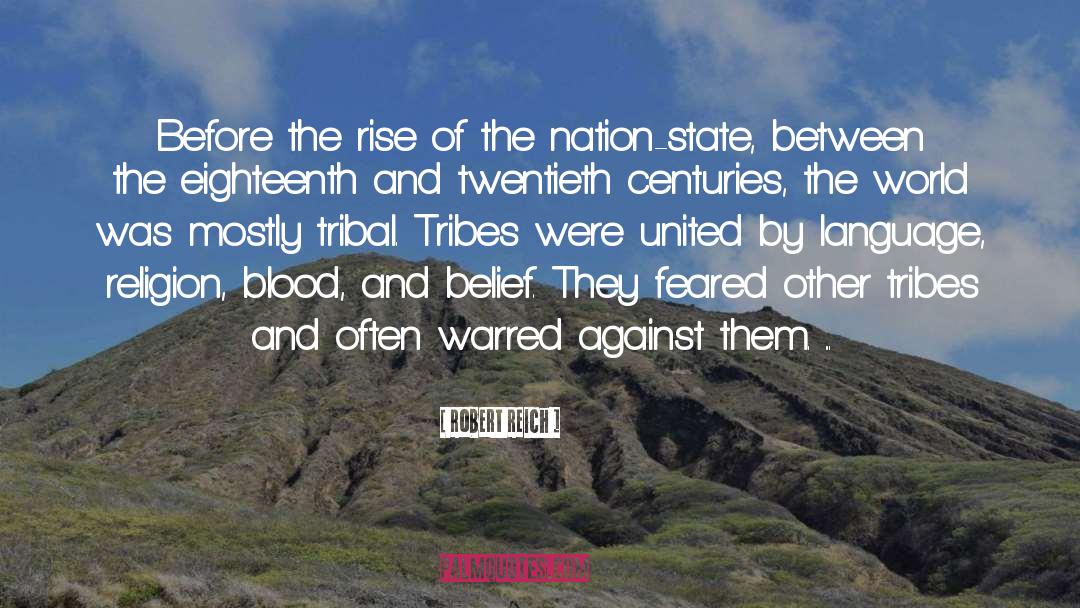
Polymeric materials in the form of wood, bone, skin and fibers have been used by man since prehistoric time. Although organic chemistry as a science dates back to the eighteenth century, polymer science on a molecular basis is a development of the twentieth century. ~ Alan J. Heeger

This medical view of an ideal male who was insulated from pathogens was inextricably bound up with a parallel discourse about the maintenance of strong ego boundaries, a psychic investment in one's bodily peripheries that effected a gradual closing (and, one might say, a closing off) of the male body, at once from the outer world of dangerous stimuli and from the inner world of threatening passions. Without a doubt, as Norbert Elias has shown, in the western world both men and women experienced a shift in their sense of personal boundaries during the early modern era where, amid changing social circumstances, rising thresholds of repugnance and shame were manifested among the upper-classes as a growing aversion to their own bodily functions and to the bodies of others. The changes wrought by new developments in table manners and etiquette were extended by the introduction of hygienic practices in the eighteenth and nineteenth centuries that endeavored to maximise the order and cleanliness of the social body while futher compartmentalising the bourgeois self as a discrete bodily unit. ~ Christopher Forth
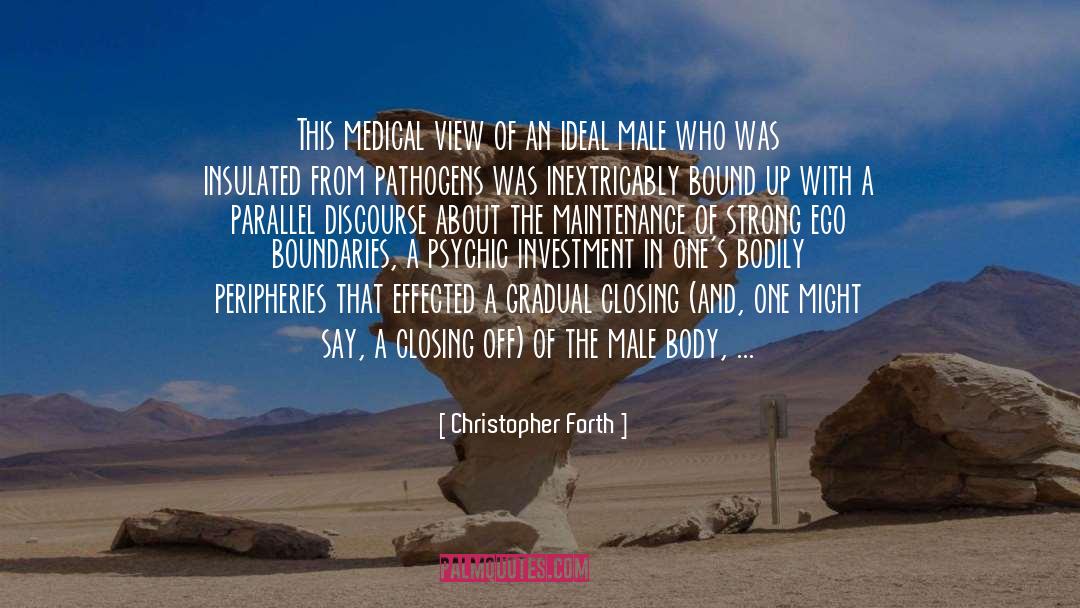
Passports were originally created to provide safe conduct in time of war. During most of the eighteenth century it seldom occurred to Europeans to abandon their travels in a foreign country which their own was fighting. ~ Murray N. Rothbard

Eighteenth century American furniture and the design of the architects Greene and Greene are my special love. ~ Barbra Streisand

No doubt, some of the champions of local government hoped to preserve such unsavory local customs as slavery or the local rule of a small group of privileged men, but many of the defenders of local government argued honestly that the states presented the best hope of securing liberty. Liberty, in the eighteenth century, meant not simply liberty from some intrusive outside power. It meant the active exercise of control over one's life, the possession of power in one's own hands. It meant government small enough and close enough to home to be directly accountable and responsive. It meant self-government, not government handed over to some remote rulers. Strictly understood, the principle of local self-government meant a share of power more or less equal to everyone else's share of power, a citizenry more or less equal in wealth and status, not one dominated by one small group or another; that is to say, it meant democracy ~ Charles L. Mee Jr.
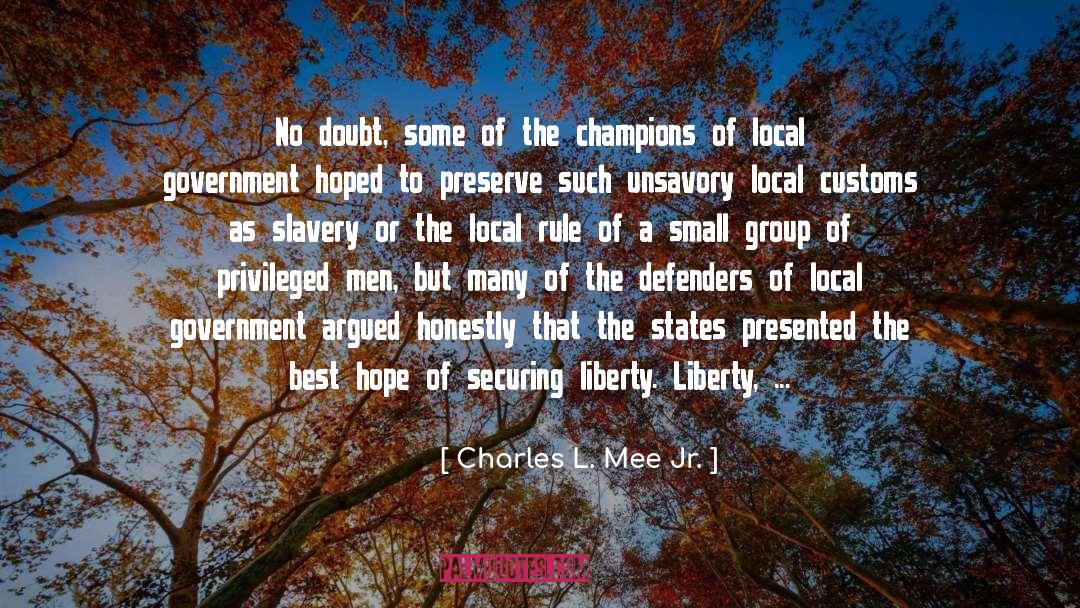
In comparison, young unmarried women in America were fortunate: They had a certain measure of sexual freedom. Eighteenth-century parents allowed their daughters to spend tie with suitors unsupervised, and courting couples openly engaged in "bundling," the practice of sleeping together without undressing, in the girls' homes. (Theoretically, that is, they were sleeping together without undressing: in fact, premarital pregnancy boomed during the period of 1750 to 1780, when bundling was nearly universal.) But by the turn of the century, in a complete reversal of previous beliefs about women's sexuality, the idea took hold that only men were carnal creatures; women were thought to be passionless and therefore morally superior. ~ Leora Tanenbaum
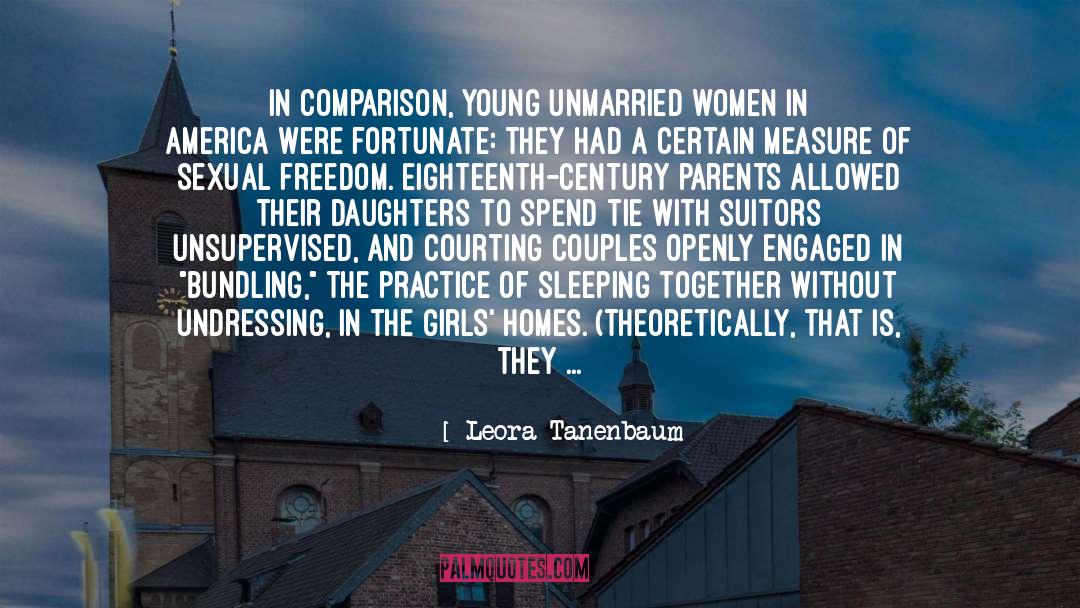
Raymond collected expressions. He repeated them in experimental accents, as if learning a tune. He sounded like an Eighteenth Street Mexican when he said cuate, like a Logan Square cubano when he said comemierda. ~ Sebastian Rotella

The Prince's name preserved, in the boldness with which its opening syllables were - to borrow an expression from music - attacked, and in the stammering repetition that scanned them, the energy, the mannered simplicity, the heavy refinements of the Teutonic race, projected like green boughs over the "Heim" of dark blue enamel which glowed with the mystic light of Rhenish window behind the pale and finely wrought gildings of the German eighteenth century. This name included, among the several names of which it was composed, that of a little German watering-place to which as a small child I had gone with my grandmother, under a mountain honoured by the feet of Goethe, from the vineyards of which we used to drink at the Kurhof the illustrious vintages with their compound and sonorous names like the epithets which Homer applies to his heroes. And so, scarcely had I heard it spoken than, before I had recalled the watering-place, the Prince's name seemed to shrink, to become imbued with humanity, to find large enough for itself a little place in my memory to which it clung, familiar, earthbound, picturesque, appetizing, light, with something about it that was authorized, prescribed. ~ Marcel Proust
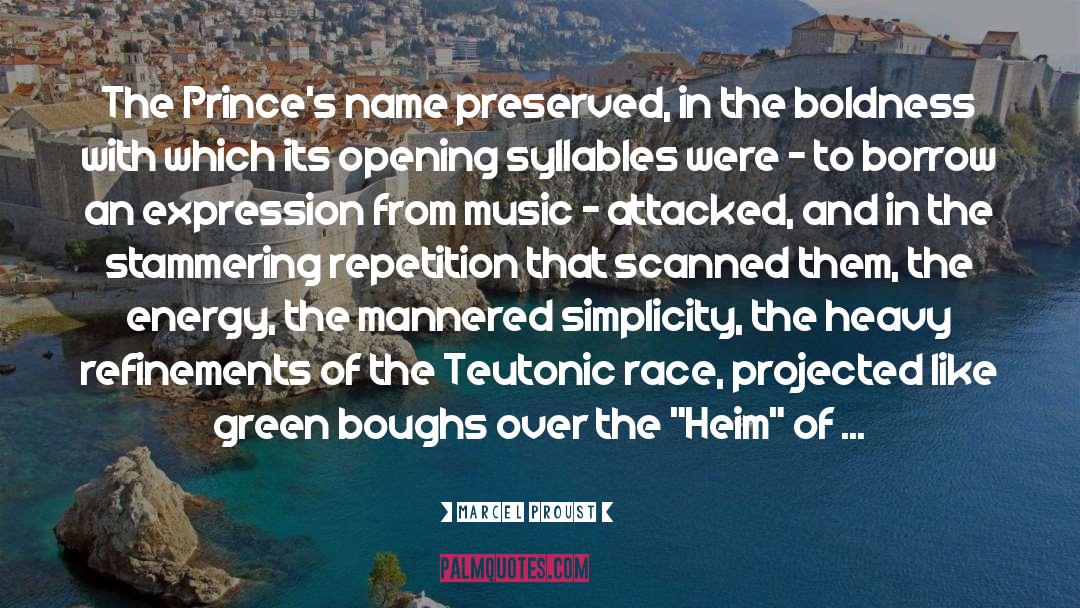
There is no way to understand the character of the taboo rules, except as a survival from some previous more elaborate cultural background. We know also and as a consequence that any theory which makes the taboo rules ... intelligible just as they are without any reference to their history is necessarily a false theory ... why should we think about [the theories of] analytic moral philosophers such as Moore, Ross, Prichard, Stevenson, Hare and the rest in any different way? ... Why should we think about our modern use of good, right and obligatory in any different way from that in which we think about late eighteenth-century Polynesian uses of taboo? ~ Alasdair MacIntyre
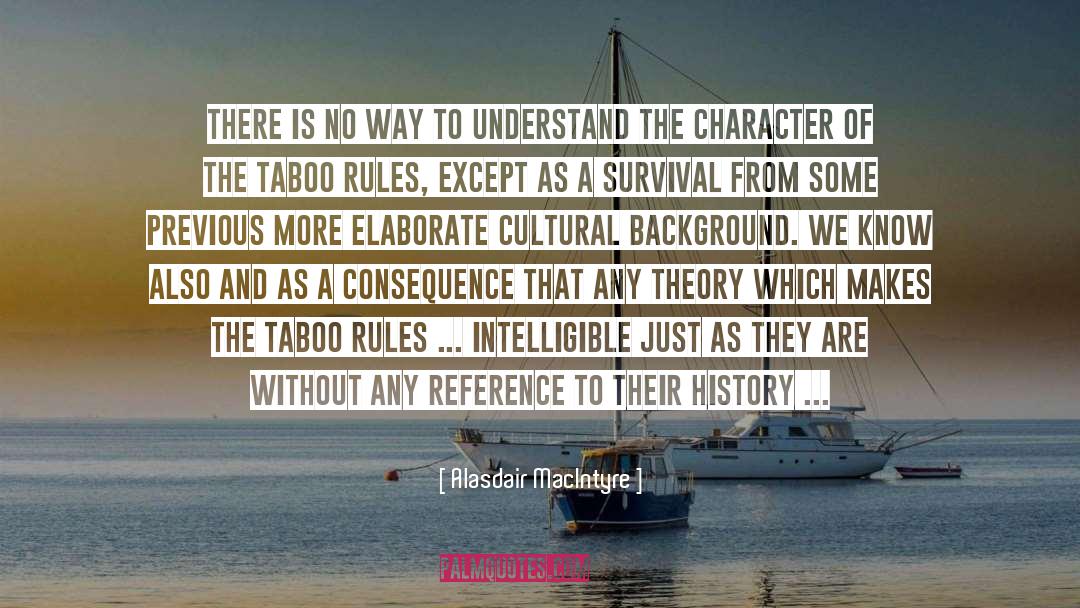
It's a criminal's playground in Humbridge city, but which gangs will battle it out to become Humbridge police's 'most wanted'? Who knows? Maybe there'll be a joint alliance in which Humbridge police would have to follow their instincts to catch these cunning criminals. It's the eighteenth century and crime is high, but Humbridge was never prepared for what's to come. ~ Francesca Caines

In the eighteenth century, philosophers considered the whole of human knowledge, including science, to be their field and discussed questions such as: Did the universe have a beginning? However, in the nineteenth and twentieth centuries, science became too technical and mathematical for the philosophers, or anyone else except a few specialists. Philosophers reduced the scope of their inquiries so much that Wittgenstein, the most famous philosopher of this century, said, "The sole remaining task for philosophy is the analysis of language." What a comedown from the great tradition of philosophy from Aristotle to Kant! ~ Stephen Hawking
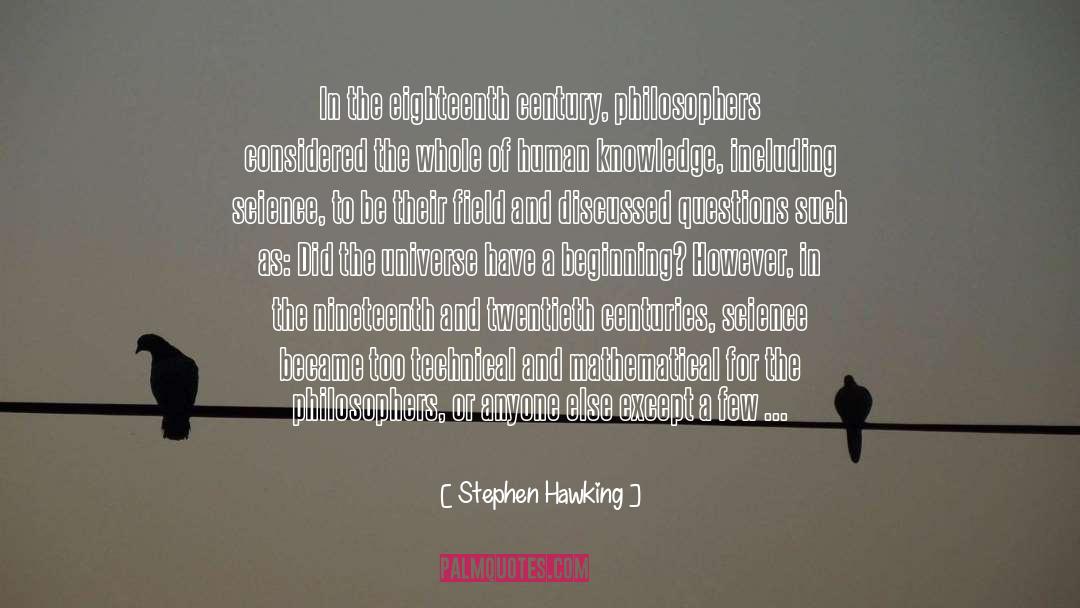
Serra was a mix of light and darkness; he was a man of great vision and great blindness, of immense zeal and immense stubbornness. In his own mind, his goals justified his treatment of the Indians, whom he loved as the children he did not have and whom he disciplined with the same ardor with which he disciplined himself. His vision, like that of many of his eighteenth century contemporaries, demanded intolerance against those with different ideas about this world and the next. These qualities do not make him an angel or a devil; they simply make him a man of his time and place. His time and place were, like ours, far from perfect."26 ~ Christian Clifford

The concept of progress, i.e., an improvement or completion (in modern jargon, a rationalization) became dominant in the eighteenth century, in an age of humanitarian-moral belief. Accordingly, progress meant above all progress in culture, self-determination, and education: moral perfection. In an age of economic or technical thinking, it is self-evident that progress is economic or technical progress. To the extent that anyone is still interested in humanitarian-moral progress, it appears as a byproduct of economic progress. If a domain of thought becomes central, then the problems of other domains are solved in terms of the central domain - they are considered secondary problems, whose solution follows as a matter of course only if the problems of the central domain are solved. ~ Carl Schmitt

The man who bears my name, and who claims to be me, was born on July 15, 1865, the sixth in a family of seven. He was an ugly child, and remained ugly till his eighteenth year, when his looks gradually improved. ~ Laurence Housman
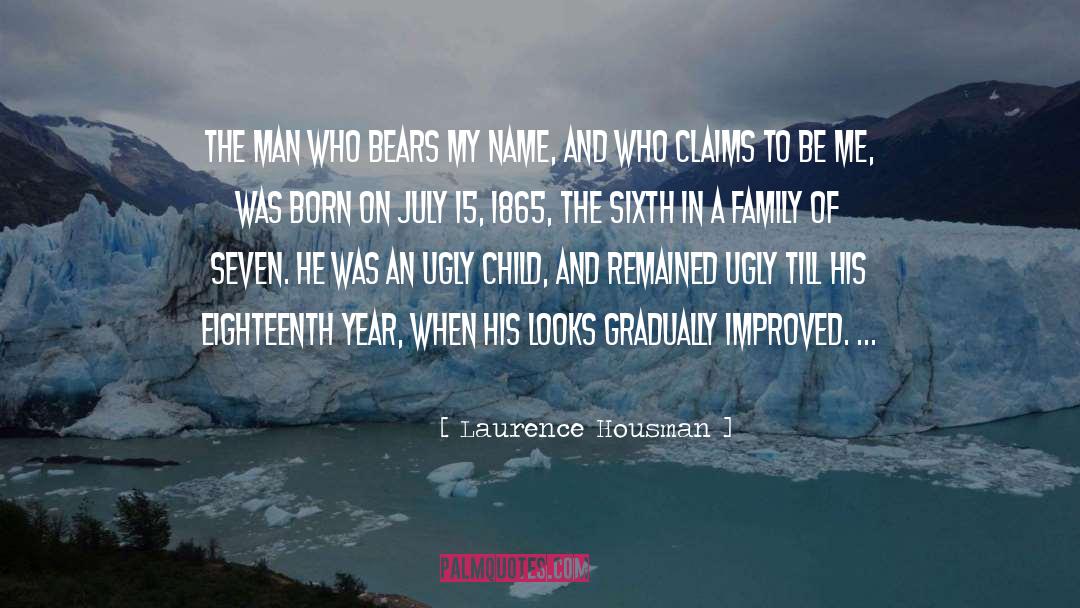
discursive regimes of the late eighteenth century drew the figure of man into the sand, and even if he manages to survive the etching, typing, and storing of the late nineteenth-century analog media, he is certain to disappear with the compression of that sand into silicon. ~ Geoffrey Winthrop-Young
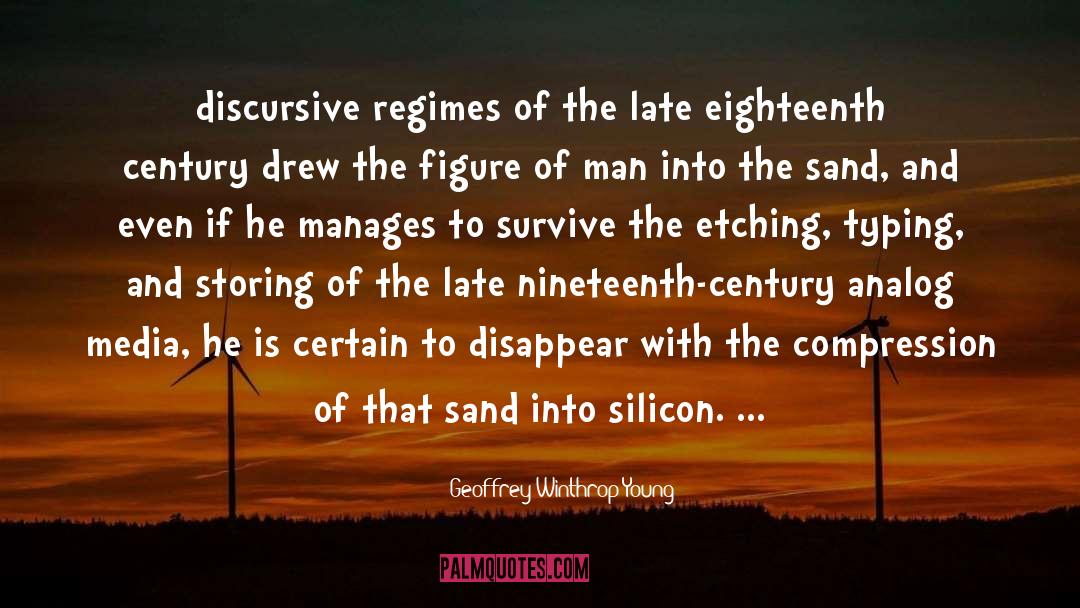
For her, from the Tiber down, there, there beyond the crumbling castles, and after the blond vineyards, there was, on the hills and mountains, and in the brief plains of Italy, a kind of great fertile womb, two swollen Eustachian tubes, streaked with an abundance of granules, the granular and greasy, the happy caviar of the race. From time to time, from the great Ovary ripened follicles opened, like pomegranate seeds: and red grains, mad with amorous certitude, descended upon the city, to encounter the male afflatus, the vitalizing impulse, that spermatic aura of which the ovarists of the eighteenth century wrote their fantastic treatise. ~ Carlo Emilio Gadda

Lying on the floor, with the carved panels of the ceiling flickering dimly above, I found myself thinking that I had always heretofore assumed that the tendency of eighteenth-century ladies to swoon was due to tight stays; now I rather thought it might be due to the idiocy of eighteenth-century men. ~ Diana Gabaldon
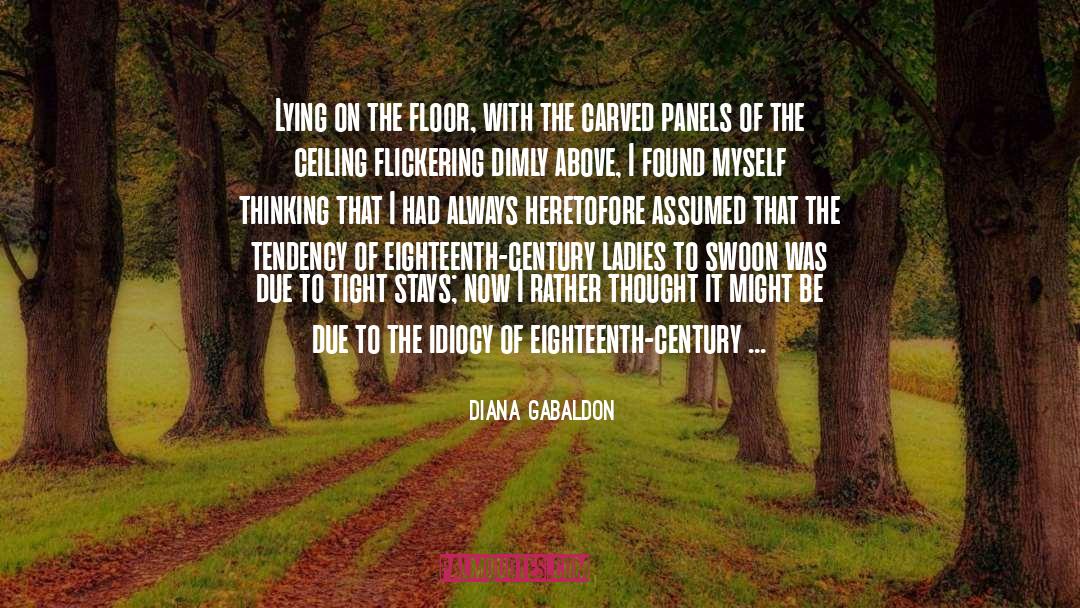
Difficulty itself may be a path toward concentration - expended effort weaves us into a task, and successful engagement, however laborious, becomes also a labor of love. The work of writing brings replenishment even to the writer dealing with painful subjects or working out formal problems, and there are times when suffering's only open path is through an immersion in what is. The eighteenth-century Urdu poet Ghalib described the principle this way: 'For the raindrop, joy is in entering the river - / Unbearable pain becomes its own cure.'
"Difficulty then, whether of life or of craft, is not a hindrance to an artist. Sartre called genius 'not a gift, but the way a person invents in desperate circumstances.' Just as geological pressure transforms ocean sediment into limestone, the pressure of an artist's concentration goes into the making of any fully realized work. Much of beauty, both in art and in life, is a balancing of the lines of forward-flowing desire with those of resistance - a gnarled tree, the flow of a statue's draped cloth. Through such tensions, physical or mental, the world in which we exist becomes itself. Great art, we might say, is thought that has been concentrated in just this way: honed and shaped by a silky attention brought to bear on the recalcitrant matter of earth and of life. We seek in art the elusive intensity by which it knows. ~ Jane Hirshfield
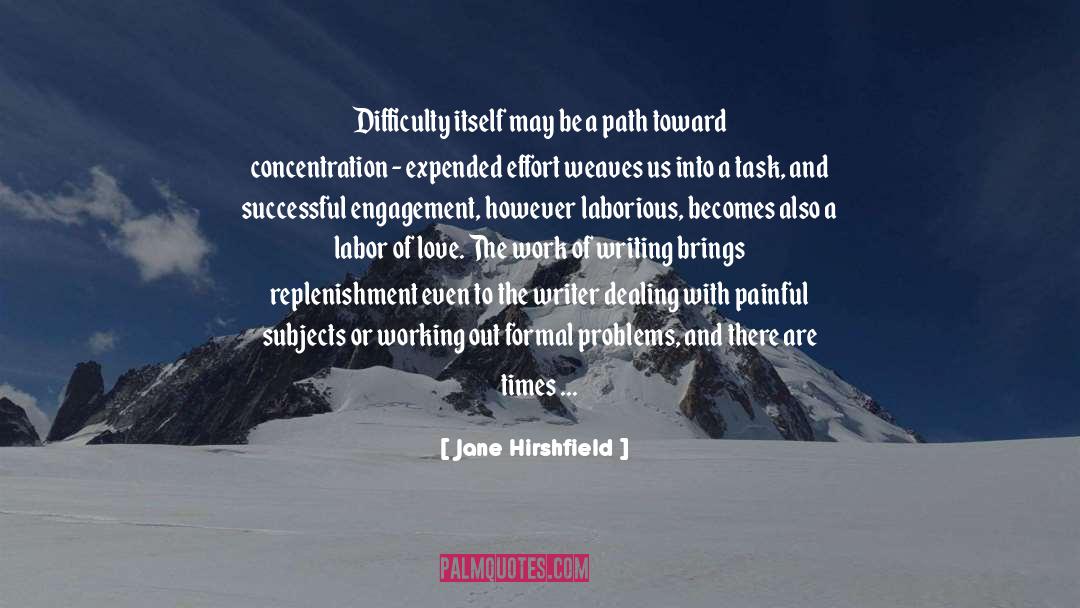
So familiar are eggs to us, however, that in the eighteenth century they were referred to as cackling farts, on the basis that chickens cackled all the time and eggs came out of the back of them. ~ Mark Forsyth

It's decided then. I'm just going to lie here and have a little pity party for myself because who spends the night of their eighteenth birthday alone in their bedroom playing Angry Birds on a phone where the settings are all in Arabic, wearing a heart-shaped locket their mom gave them? Oh yeah, that's right, someone with no life. And no prospect of ever getting one. ~ Mila Gray

I was very much into buying contemporary art, but I've just decided I want to get rid of it all. Not that it's not great art, but all of a sudden my mood has changed, and I want to go back to seventeenth- and eighteenth-century masters. ~ Sylvester Stallone
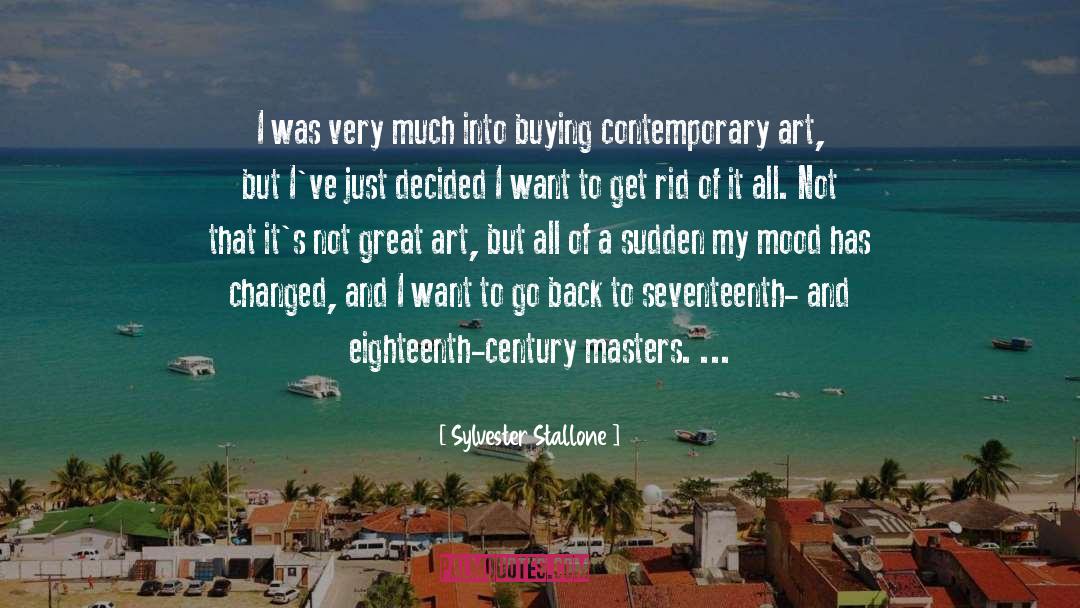
In his theory of the sublime, eighteenth-century philosopher Edmund Burke proposes the notion of "negative pain": the idea that a feeling of fear - paired with a sense of safety, and the ability to look away - can produce a feeling of delight. One woman can sit on her couch with a glass of Chardonnay and watch another woman drink away her life. ~ Leslie Jamison

The poetry from the eighteenth century was prose; the prose from the seventeenth century was poetry. ~ David Hare
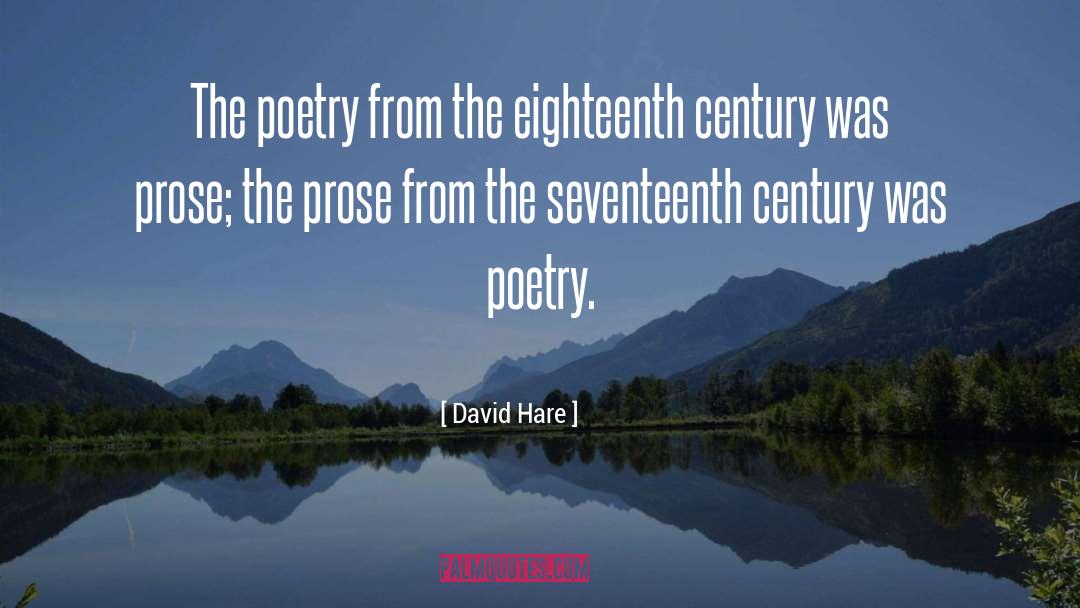
It was only as part of the civilizing process that storytelling developed within the aristocratic and bourgeois homes, in the seventeenth and eighteenth centuries through governesses and nannies, and later in the eighteenth and the nineteenth centuries through mothers, who told bedtime stories. ~ Jack D. Zipes
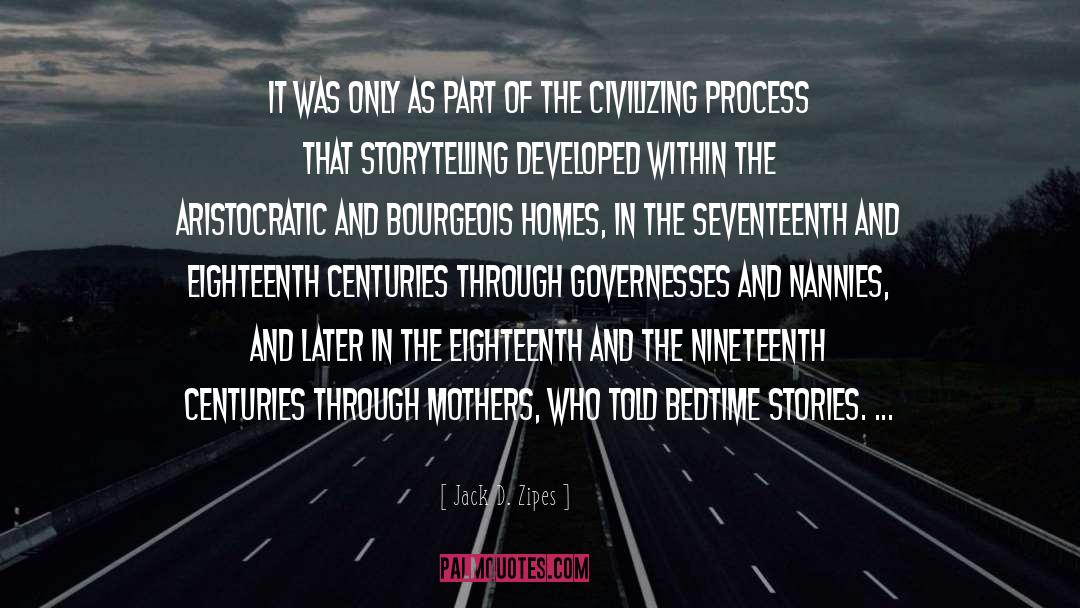
During the Renaissance there was a renewed interest in the relationship between genius, melancholia, and madness. A stronger distinction was made between sane melancholies of high achievement and individuals whose insanity prevented them from using their ability. The eighteenth century witnessed a sharp change in attitude; balance and rational thought, rather than "inspiration" and emotional extremes, were seen as the primary components of genius. ~ Kay Redfield Jamison
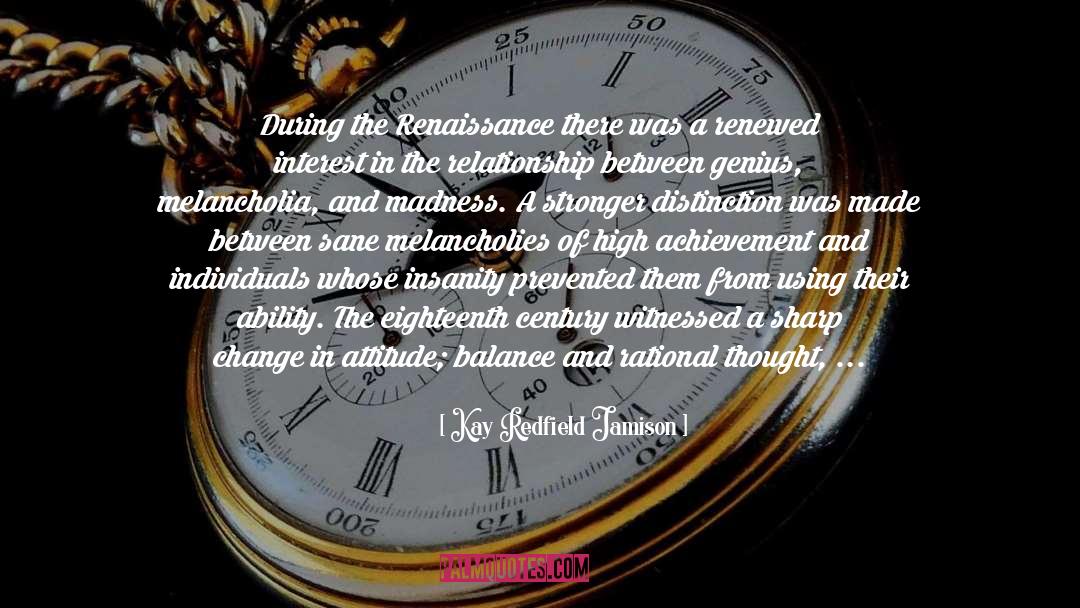
She isn't stupid. She's intelligent enough in a purely feminine way. Eighteenth-century France would have been a marvellous setting for her, or the old South if she hadn't made the mistake of being born a Negro. ~ Nella Larsen
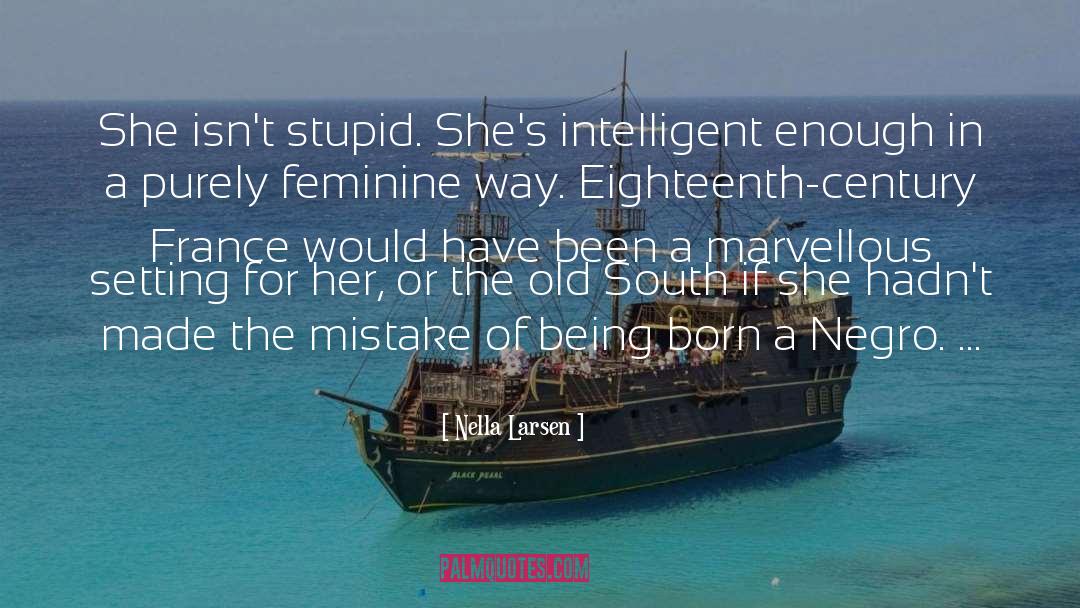
Early eighteenth-century Italy saw facial powder at the center of the biggest scandal ever to befall a cosmetics manufacturer. A woman named Signora Toffana, who was well known in upper-class social circles, created a face powder that contained lead and arsenic and sold it to the wives of noblemen and the wealthy. The more affectionate the husband was with pecks on his wife's cheeks, the faster he died from the toxic powder. An estimated 600 husbands died this way, and Toffana was executed as an accomplice in their deaths. ~ Samuel S. Epstein

The bourgeois thinkers of the eighteenth century thus turned Aristotle's formula on its head: satisfactions which the Greek philosopher had identified with leisure were now transposed to the sphere of work, while tasks lacking in any financial reward were drained of all significance and left to the haphazard attentions of decadent dilettantes. It now seemed as impossible that one could be happy and unproductive as it had once seemed unlikely that one could work and be human. ~ Alain De Botton
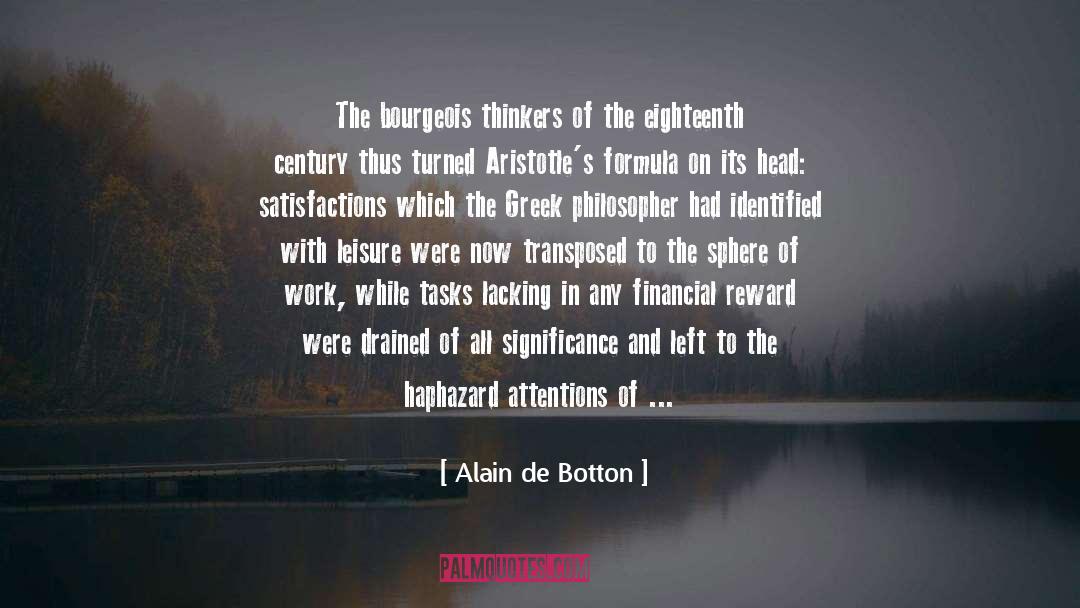
The liberal tradition has its roots in the Enlightenment, that period in the eighteenth-century Europe when intellectuals and political leaders had a powerful sense that reason could be employed to make the world a better place. ~ John Mearsheimer
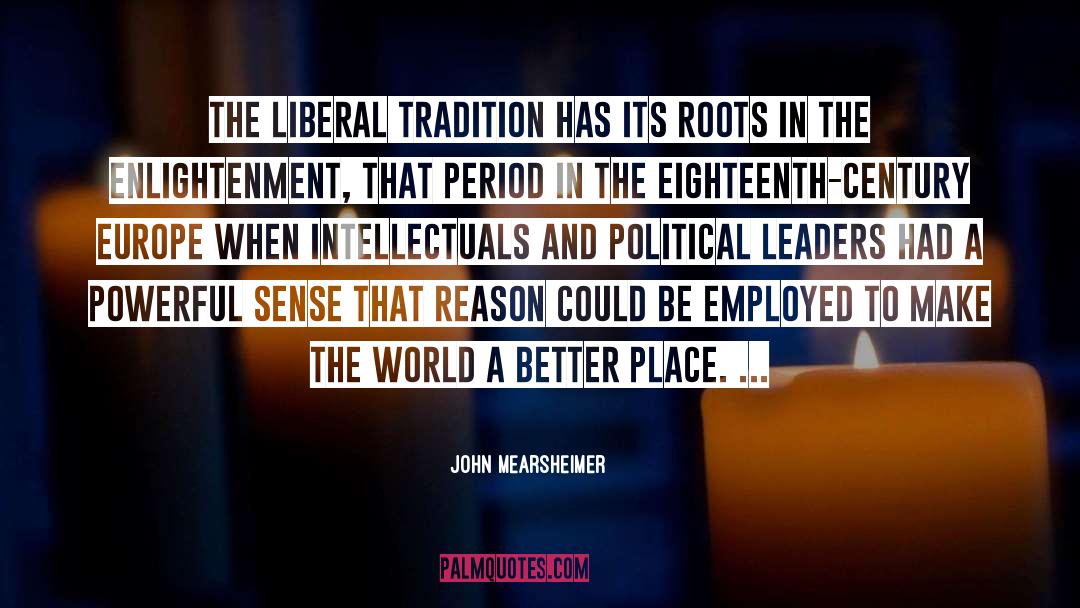
It is a common misconception, in the spirit of the sentiments expressed in Q16, that Godel's theorem shows that there are many different kinds of arithmetic, each of which is equally valid. The particular arithmetic that we may happen to choose to work with would, accordingly, be defined merely by some arbitrarily chosen formal system. Godel's theorem shows that none of these formal systems, if consistent, can be complete; so-it is argued-we can keep adjoining new axioms, according to our whim, and obtain all kinds of alternative consistent systems within which we may choose to work. The comparison is sometimes made with the situation that occurred with Euclidean geometry. For some 21 centuries it was believed that Euclidean geometry was the only geometry possible. But when, in the eighteenth century, mathematicians such as Gauss, Lobachevsky, and Bolyai showed that indeed there are alternatives that are equally possible, the matter of geometry was seemingly removed from the absolute to the arbitrary. Likewise, it is often argued, Godel showed that arithmetic, also, is a matter of arbitrary choice, any one set of consistent axioms being as good as any other. ~ Roger Penrose
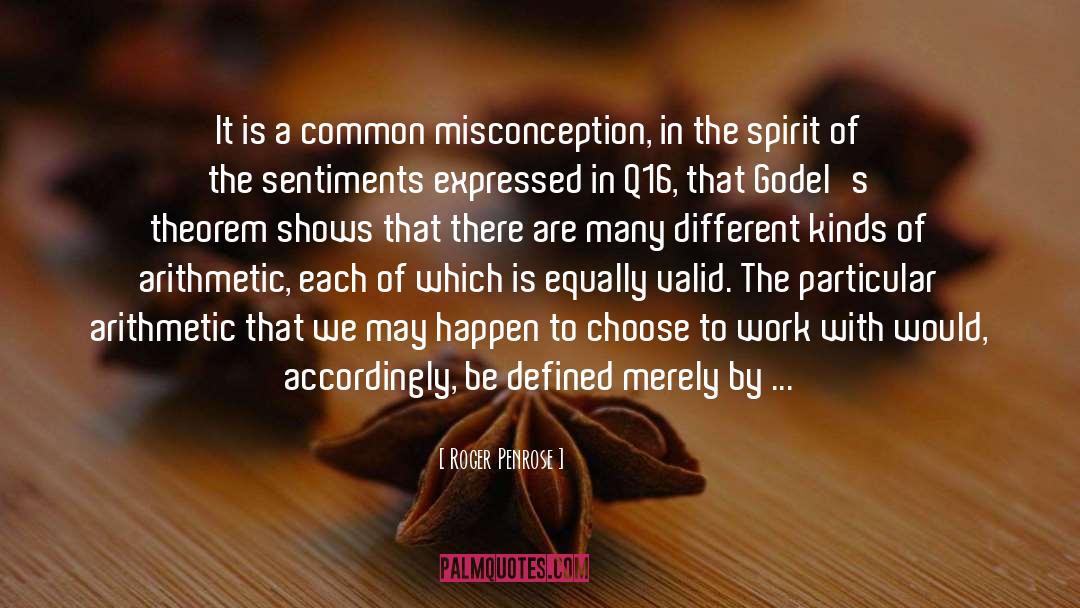
The private motives of scientists are not the trend of science. The trend of science is made by the needs of society: navigation before the eighteenth century, manufacture thereafter; and in our age I believe the liberation of personality. Whatever the part which scientists like to act, or for that matter which painters like to dress, science shares the aims of our society just as art does. ~ Jacob Bronowski

Then again, it'd taken more than two hundred years after the invention of the scientific method before any Muggle scientists had thought to systematically investigate which sentences a human four-year-old could or couldn't understand. The developmental psychology of linguistics could've been discovered in the eighteenth century, in principle, but no one had even thought to look until the twentieth. So you couldn't really blame the much smaller wizarding world for not investigating the Retrieval Charm. ~ Eliezer Yudkowsky
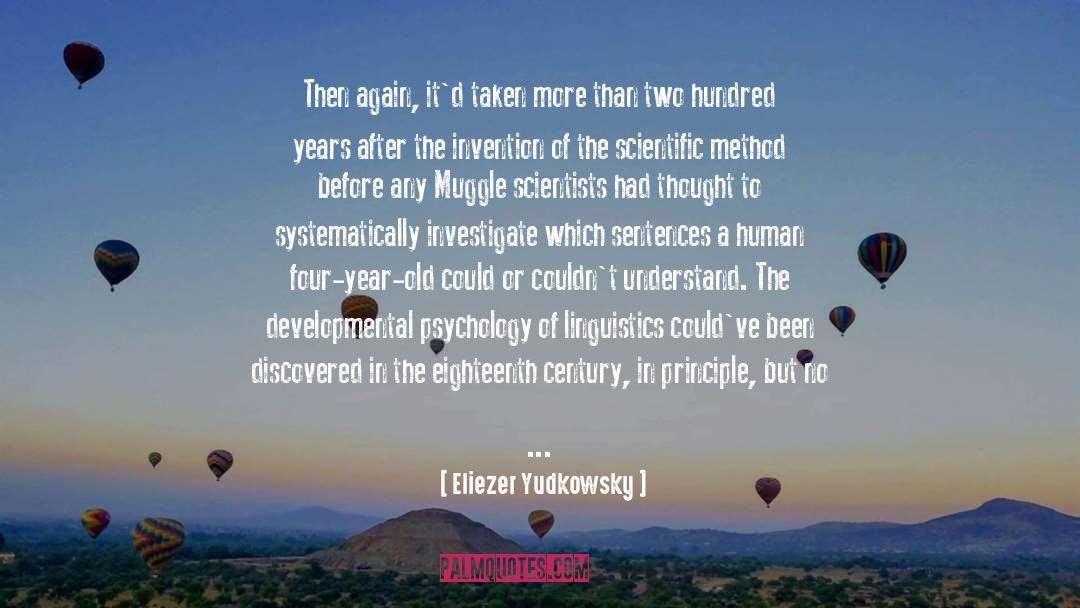
Not only have I been an old maid since my eighteenth birthday, but I'm driving the bandwagon for old maids of America. I might even start an Alliance. Of course, there will be a four-cat minimum for admittance into to organization. Bonus points if you live with your mother. A spot on the board if she happens to be a battle-ax that prefers pond scum sleeping next to her at night. ~ Addison Moore
